英语
- 格式:doc
- 大小:146.50 KB
- 文档页数:19
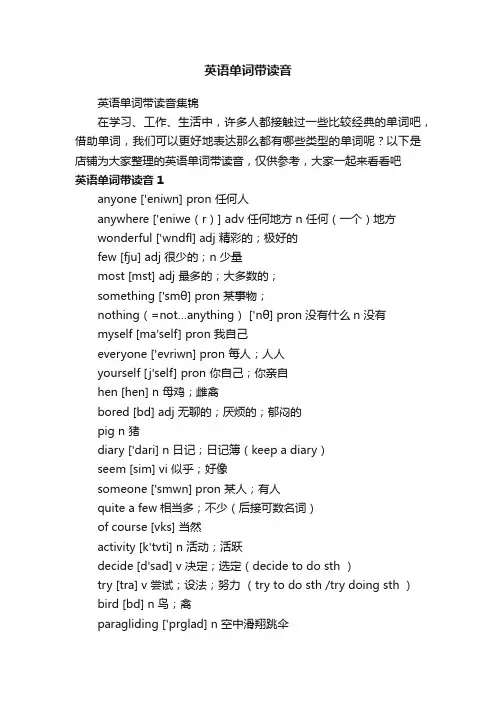
英语单词带读音英语单词带读音集锦在学习、工作、生活中,许多人都接触过一些比较经典的单词吧,借助单词,我们可以更好地表达那么都有哪些类型的单词呢?以下是店铺为大家整理的英语单词带读音,仅供参考,大家一起来看看吧英语单词带读音1anyone ['eniwn] pron 任何人anywhere ['eniwe(r)] adv 任何地方 n 任何(一个)地方wonderful ['wndfl] adj 精彩的;极好的few [fju] adj 很少的;n 少量most [mst] adj 最多的;大多数的;something ['smθ] pron 某事物;nothing(=not…anything)['nθ] pron 没有什么n 没有myself [ma'self] pron 我自己everyone ['evriwn] pron 每人;人人yourself [j'self] pron 你自己;你亲自hen [hen] n 母鸡;雌禽bored [bd] adj 无聊的;厌烦的;郁闷的pig n 猪diary ['dari] n 日记;日记簿(keep a diary)seem [sim] vi 似乎;好像someone ['smwn] pron 某人;有人quite a few相当多;不少(后接可数名词)of course [vks] 当然activity [k'tvti] n 活动;活跃decide [d'sad] v 决定;选定(decide to do sth )try [tra] v 尝试;设法;努力(try to do sth /try doing sth )bird [bd] n 鸟;禽paragliding ['prɡlad] n 空中滑翔跳伞bicycle ['baskl] n 自行车building ['bld] n 建筑物trader ['tred(r)] n 商人;商船wonder ['wnd(r)] v 惊奇;想知道;怀疑difference ['dfrns] n 差异;不同top [tp] n 顶部;顶wait [wet] v 等;等待(wait for)umbrella [m'brel] n 伞;雨伞wet [wet] adj 湿的;雨天的below [b'l] prep 低于;在下面adv 在下面as [z] conj 如同;像一样enough ['nf] adj 足够的adv 足够地;充分地duck [dk] n 鸭肉;鸭hungry(反full) ['hɡri] adj 饥饿的;渴望的feel like(doing sth )想要dislike [ds'lak] v 不喜欢;厌恶 n 不喜爱;厌恶;反感because of因为;由于have a good time=enjoy oneself=have fun(doing sth )玩得痛快英语单词带读音2fabric [fbrik] n 织物,布;构造,组织fabulous [fbjuls] a 寓言般的,难以置信的;极为美好的facile [fsail] a 容易达到的;便利facsimile [fksimili] n (文字、图画等的)副本;传真;fair [f]a 公平的 ad 公正地 n 游乐场,集市;博览会faith [feiθ] n 信任,信赖,信心;信仰,信条fake [feik] n 假货;骗子 a 假的的 vt 伪造;伪装fallow [flu] a 犁过而未播种的,休闲的;(指耕地)未经耕作的;休闲地,休耕地falsehood [f:lshud] n 谎言;假话;虚假falsification ['f:lsifi'kein] n 篡改;伪造;fame [feim] n 名声,名望famine [fmin] n 饥荒fan [fn] n 扇子;风扇;扇形物;狂热爱好者,迷fancy [fnsi] vt 喜欢 a 高档的 n 爱好;想象力;设想fantasy [fntsi] n 想像,幻想;fare [f] n 费用,票价;fascinate [fsineit] vt 使着迷,使极感兴趣;fatal [feitl] a 致命的;灾难性的;重大的,决定性的fatigue [fti:g] n 疲劳,劳累 v (使)疲劳feast [fi:st] n 盛宴;节日feather [fe] n 羽毛fee [fi:] n 费,酬金feeble [fi:bl] a 虚弱的,衰弱的,无力的feisty ['faisti] a 个性强而好争辩的felon [feln] n 重罪犯fertile [f:tail] n 多产的,富饶的festive [festiv] a 节日的,fete [feit] vt 庆祝fetid [fi:tid] a 恶臭的fib [fib] n 小谎,无关紧要的谎话fierce [fis] a 凶猛的;凶狠的;fiery [fairi] a 燃烧的;易怒的,暴躁的figure [fig] n 数字;图解,图表filling [fili] n 馅fission ['fin] n (原子的)分裂,裂变;fissure [fi] n 狭长裂缝或裂隙,分裂fizzle ['fizl] v 发嘶嘶声n 嘶嘶声flair [fle] n 天资;天分;眼光;才华flash [fl] vi 闪光;掠过 n 闪光(烁,现);闪光灯flatten [fltn] v 把…弄平;击倒flattery [fltri] n 奉承,拍马屁flax [flks] n 亚麻flee [fli:] vi 逃走,逃掉;vt 逃离,逃避flexible [fleksbl] a 易弯曲的,柔韧的;flood [fld] v (使)为水淹没;n 洪水flour [flau] n 面粉flourish [flri] vi 茂盛,繁荣;兴旺发达fluctuate [flktueit] vi 波动,涨落,起伏flue [flu:] n 烟道,暖气管flute [flu:t] n 长笛fodder [fd] n 草料,饲料foil [fil] n 箔,金属薄片;fold [fuld] v 折叠,交叠 n 褶痕,褶缝,折叠的部分foolhardy [fu:lhɑ:di] a 莽撞的;有勇无谋的forbearance [f:berns] n 忍耐,克制;宽容forbid [fbid] vt 禁止,不许;阻止,妨碍force [f:s] n 力量;力气;武力;影响力foretell [f:'tel] v 预言;预示forethought ['f:θ:t] n 事先考虑forewarning [f:'w:ni] a 预先警告的forgive [fgiv] vt 原谅;饶恕;免除formal [f:ml] a 正式的;礼仪上的,形式上的formation [f:mein] n 形成,构成;编队,排列formidable [f:midbl] a 可怕的,令人畏惧的;fort [f:t] n 堡垒,城堡fortify [f:tifai] vt 增强;强化fortnight [f:tnait] n 两星期,十四天fortunate [f:tnt] a 交好运的,带来好运的;幸运的fossil [fsl] n 化石;foster [fst] vt 培养,促进;foundation [faundein] n 建立,设立,创办;基,基金(会)founder [faund] n 建立者;创设者;v 轮船沉没,计划失败fountain [fauntin] n 喷水;喷泉fractious [frks] a 易怒的',急躁的fragile [frdail] a 易碎的,脆的,脆弱的;fragrant [freigrnt] a 芳香的,香的frail [freil] a 脆弱的,薄弱的,frame [freim] n 框架;骨架,构架;frantic [frntik] a 发疯似的,发狂的;frequent [fri:kwnt] a 时常发生的,常见的;fret [fret] v (使某人)不愉快,烦躁;磨损,咬坏;friction [frikn] n 摩擦;;冲突,不和frightful [fraitfl] a 吓人的,令人惊恐的;可怕的fringe [frind] n (外衣,小地毯等的)饰边,穗子,流苏,须边frog [frg] n 青蛙frown [fraun] v 皱眉,不悦,不赞成frugal [fru:gl] a 节省的,节俭的;frustrate [frstreit] vt 使不成功,挫败,阻止fulfill [fulfil] vt 履行,实现,完成(计划等)furious [fjuris] a 狂怒的,暴怒的;强烈的,激烈的furnace [f:nis] n 熔炉,火炉fusion [fju:n] n 熔合;核聚变;联合,合并fussy [fsi] a 大惊小怪的futile [fju:tail] a 无效的,无用的,无意义的英语单词带读音3housework ['haswk] n 家务劳动hardly ['hɑdli] adv 几乎不;简直不;刚刚ever ['ev(r)] adv 曾经;在任何时候once [wns] adv 一次;曾经twice [twas] adv 两倍;两次Internet ['ntnet] n 因特网program ['prɡrm] n 节目;程序;课程;节目单full [fl] adj 满的;充满的;完全的swing [sw] n 摇摆;秋千v 摇摆;旋转maybe ['mebi] adv 或许;也许;可能swing dance摇摆舞least [list] adj 最小的;最少的at least至少hardly ever很少;几乎从不;难得junk n 垃圾;废旧杂物coffee ['kfi] n 咖啡;咖啡色health [helθ] n 健康;人的身体或精神状态result [r'zlt] 结果;后果percent [p'sent] adj 百分之的online [n'lan] adj 在线的adv 在线地television ['telvn] n 电视机;电视节目although [l'] conj 虽然;尽管;然而;可是through [θru] prep 穿过;凭借;一直到body ['bdi] n 身体mind [mand] 头脑;想法;意见;心思such [st] adj 这样的;如此的together [t'ɡe(r)] adv 共同;一起die [da] v 死;枯竭;消失writer ['rat(r)] n 作者;作家dentist ['dentst] n 牙科医生magazine ['mɡzin] n 杂志however [ha'ev(r)] adv 然而;无论如何;不管多么than [n] conj 比almost ['lmst] adv 几乎;差不多none [nn] pron 没有人;没有任何东西,毫无less [les] adj 更少的;较少的point [pnt] n 看法;要点;重点;小数点;目标;分数such as例如;诸如英语单词带读音4will [wil, wl,] 将、会、要robot ['rubt] n 机器人won't=will notthey'll=they willeverything [evriθi] pron 每件事物paper ['peip] n 纸;纸张fewer ['fju:] adj (few的比较级)较少的;较少数pollution [p'lun] n 污染tree [tri:] n 树;树木she'll=she willbuilding ['bildi] n 建筑物;房屋astronaut ['strn:t] n 宇航员,航天员rocket ['rkit] n 火箭space [speis] n 空间;太空space station 空间站fly [flai] v 飞行took [tk] v take的过去式moon [mu:n] n 月亮;月球I'll = I willfall [f:l] v 落下;跌落;变为fell [fel] v fall的过去式fall in love with 爱上alone ['lun] adv 单独地;孤独地pet [pet] n 宠物parrot ['prt] n 鹦鹉go skating去滑冰suit [sju:t] n 一套衣服able ['eibl] 能、能够be able to 有能力做某事、会做某事dress [dres] v 穿衣casually ['kjl] adv 非正式地;随意地which [hwit,wt] pron 哪个;哪几个even ['i:vn] adv 甚至The World [w:ld] Cup 世界杯wrote [rt] v write的过去式myself [mai'self] pron (反身代词)我自己;我本人interview ['intvju:] n 面试;面谈predict [pri'dikt] v 预报;预言带读音英语单词大全(五)sound [saund] n 声音company ['kmpni] n 公司Thought [θ:t] v think的过去式strategy ['strtidi] 策略、战略fiction ['fikn] n 小说unpleasant [n'pleznt] adj 使人不愉快的scientist ['saintist] n 科学家in the future ['fju:t] 未来、将来hundred ['hndrd] n 一百hundreds of 大量、许多have得(病)、患(病)already [:l'redi] adv 早已;先前made v make的过去式factory ['fktri,fktri] n 工厂simple ['simpl] adj 简单的;简易的such [st] adj 这样的;这种bored [b:d] adj 厌烦的;厌倦的everywhere ['evrihw] adv 各地;到处human ['hju:mn] n 人;人类huge [hju:d] n 巨大的;极大的shape [eip] n 外形;形状earthquake [':θkweik] n 地震snake [sneik] n 蛇possible ['psbl] adj 可能的electric [I'lektrik] adj 电的;导电的toothbrush ['tu:θ'br] n 牙刷seem v 像是;似乎impossible [im'psbl] adj 不可能的;不会发生的英语单词带读音5token 表示,标志,象征He did that as a ~ of good faithtorture 拷打,拷问~ a confession from a prisoneraccommodate 使适应,使符合一致 accommodate oneself to changed circumstancesunfold 展开,打开~ a newspaperuniform 制服;不变的,相同的,均匀,统一的 a ~temperatureunify 使成一体,统一 become a unified nation更新,使现代化~a textbookupgrade 提高,使升级,改善~ products and servicesuphold 举起,高举 He upheld his clenched handupright 挺直的,垂直的 an ~ seatadhere 黏附,附着 Paste is used to make one surface adhere to another.adjacent 临近的,毗邻的(to) a city and its adjacent suburbs adjoin 贴近,与...毗邻 His house adjoins the lake.thrust 推,刺,戳,插,挤He was ~ into powertick (钟声等发出的)滴答声tilt 使倾斜,使倾倒 Tilt your head back so that I can look down your throattoss 扔,抛,掷 The children tossed the ball to each othertough 坚韧的,牢固的 Some plastic are as ~ as metaltow 拖,拉,牵引 tow a damaged ship into portabstract 抽象的A flower is beautiful, but beauty itself is abstract.absurd 荒谬的,荒唐的 The idea that number 14 brings bad luck is absurd.uproar 骚乱,骚动The public ~over unclear-radiation hazards continues to mountutilize 利用~ solar energyutter 发出(声音等),说,吐露~ the truthvacant 未被占用的 a ~ seat in a busvague 含糊的,不明确的,模糊的 a ~ answerslip 滑倒,滑落,滑行 She ~ed on the wet stones and fellslit 切开,撕开~ the envelope openslope 倾斜,有坡度 The ground ~s down sharply at this point sly 狡猾的,偷偷的 a ~answersmash 打碎,打破,摧毁 The ball ~ed the windowsnatch 夺得,一把抓住 The thief ~ed her handbag and ran offimmune免除的,豁免的:Nobody is immune from criticism impact 冲击,撞击:the impact of light on the eyeimpair 削弱,减少:The output of produce was impaired by the bad weatherimpartial 公正的,无偏见的:A judge should be impartialimplement 工具,器具,用具:new types of farm implements sting刺,螫,叮 A bee stung him on the neckstir 使微动,移动 A breeze ~red my hairstitch 一针,针脚 Make your ~es closer togethersue 控告,起诉~ sb for slandersummary 总结,概要 This book has a ~ at the end of each chaptersuperb 极好的,一流的,杰出的~ science and engineering superficial 表面的 a ~resemblancesuperfluous过多的,剩余的,多余的a ~remarksupervise 监督,管理,指导~sb’s every movevanish 突然消失,逐渐消散With a wave of his hand, the magician made the rabbitveil 面纱,面罩 Jewish women wore ~s in token of reverence and submissionventilate 使通风,使空气流通~ a roomventure 冒险,冒险行动,投机行动take a ~ in oiluncover 揭开,揭露~ a dish of foodunderestimate 低估~ the difficulties of the taskreassure v.使安心,使放心;使消除疑虑英语单词带读音6advantageous contract 有利的合同bargaining range 谈判范围concede ground 让步,屈服bargaining strength 谈判实力concession trading 让步贸易bargaining 讨价还价conflicting interests利益冲突conflicting objectives冲突的目标behavioral norms 行为规范core outcomes 核心结果bottom line 谈判底线breakdown in negotiation 谈判破裂collective well - being 集体利益difficult decisions 决策困难negotiation sketch 谈判简图equitable agreement 公平合理的协议negotiation skills 谈判技巧on the routine basis 在惯例的基础上expected benefits 期待的谈判结果one-off business 一锤子买卖face-to-face negotiation 面对面谈判opening position 初步价位factual information 实际信息optimal timing 最佳时机fail to reach any agreement 无法达成协议optimize the interests使利益最优化pull tricks 耍花招renounce a negotiation 放弃谈判favorable outcomes 利好结果reservation price 保留价格room for maneuver 周旋的余地good joint outcome 互惠的共同结果rough style 激烈的谈判风格information loophole 信息空缺settle differences 解决分歧sham position 虚假立场signal firmness 表现出坚定立场organizational structure 组织结构organizationally ambitious 对组织工作有远大抱负的organization’s ends 组织目标higher-up 上级personal attractiveness 个人魅力individual goal 个人目标induce cooperation 促使合作pressing deskwork 紧迫的案头工作informal influence 非正式影响public speaking skills 演讲技能interactions 相互交流relevance of the work 工作的实用性interpersonal activities 交际活动leader power 领导权力。
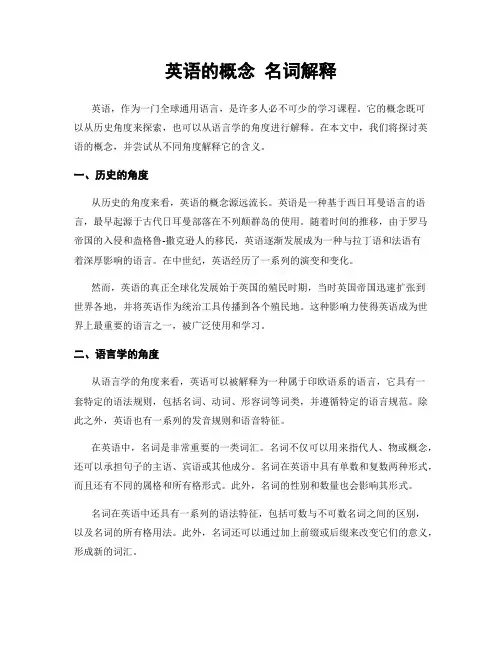
英语的概念名词解释英语,作为一门全球通用语言,是许多人必不可少的学习课程。
它的概念既可以从历史角度来探索,也可以从语言学的角度进行解释。
在本文中,我们将探讨英语的概念,并尝试从不同角度解释它的含义。
一、历史的角度从历史的角度来看,英语的概念源远流长。
英语是一种基于西日耳曼语言的语言,最早起源于古代日耳曼部落在不列颠群岛的使用。
随着时间的推移,由于罗马帝国的入侵和盎格鲁-撒克逊人的移民,英语逐渐发展成为一种与拉丁语和法语有着深厚影响的语言。
在中世纪,英语经历了一系列的演变和变化。
然而,英语的真正全球化发展始于英国的殖民时期,当时英国帝国迅速扩张到世界各地,并将英语作为统治工具传播到各个殖民地。
这种影响力使得英语成为世界上最重要的语言之一,被广泛使用和学习。
二、语言学的角度从语言学的角度来看,英语可以被解释为一种属于印欧语系的语言,它具有一套特定的语法规则,包括名词、动词、形容词等词类,并遵循特定的语言规范。
除此之外,英语也有一系列的发音规则和语音特征。
在英语中,名词是非常重要的一类词汇。
名词不仅可以用来指代人、物或概念,还可以承担句子的主语、宾语或其他成分。
名词在英语中具有单数和复数两种形式,而且还有不同的属格和所有格形式。
此外,名词的性别和数量也会影响其形式。
名词在英语中还具有一系列的语法特征,包括可数与不可数名词之间的区别,以及名词的所有格用法。
此外,名词还可以通过加上前缀或后缀来改变它们的意义,形成新的词汇。
值得一提的是,英语名词的使用也受到语境和习惯用法的影响。
在不同的语境中,名词可以有不同的含义和用法,这使得学习英语的人需要注重词义的理解和语境的把握。
三、英语的应用英语作为一种语言,在世界上广泛应用。
它是联合国的工作语言之一,也是许多国际组织和学术机构使用的语言。
无论是商务交流、学术研究还是跨文化交流,英语都扮演着重要的角色。
在现代科技与全球化的背景下,英语的重要性更加凸显。
通过掌握英语,人们可以更方便地获取国际新闻、文化资讯以及学习最新科技知识。

【导语】英语⼝语是被外国⼈民普遍应⽤的⼝头交流语⾔形式。
英语⼝语灵活多变,多因场合与发⾔者不同⽽被⾃由使⽤。
以下⽂章由整理,欢迎阅读!更多相关讯息请关注!【篇⼀】 【篇⼀】 1. Hello.你好! 2. Good morning.早晨好! 3. I’m John Smith.我是约翰、史密斯。
4. Are you Bill Jones?你是⽐尔、琼斯吗? 5. Yes,I am.是的,我是。
6. How are you?你好吗? 7. Fine,thanks.很好,谢谢。
8. How is Helen?海伦好吗? 9. She’s very well,thank you. 她很好,谢谢您。
10. Good afternoon,Mr. Green.午安,格林先⽣。
11. Good evening,Mrs. Brown.晚上好,布朗夫⼈。
12. How are you this evening?今晚上您好吗? 13. Good night,John.晚安,约翰。
14. Good-bye,Bill.再见,⽐尔。
15. See you tomorrow.明天见。
16. Come in,please. 请进! 17. Sit down. 坐下! 18. Stand up,please. 请站起来。
19. Open your book,please. 请把书打开。
20. Close your book,please. 请把书合上。
21. Don’t open your book. 别打开书。
22. Do you understand?你明⽩了吗? 23. Yes,I understand. 是的,我明⽩了。
24. No,I don’t understand. 不,我不明⽩。
25. Listen and repeat. 先听,然后再重复⼀遍。
26. Now read,please. 现在请⼤家读。
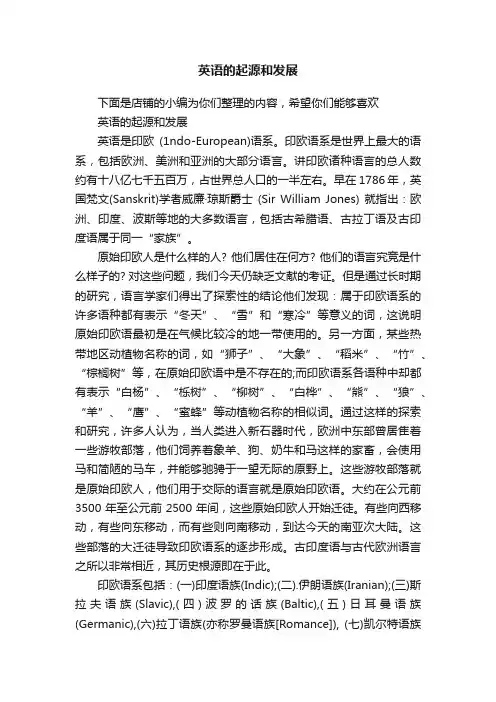
英语的起源和发展下面是店铺的小编为你们整理的内容,希望你们能够喜欢英语的起源和发展英语是印欧(1ndo-European)语系。
印欧语系是世界上最大的语系,包括欧洲、美洲和亚洲的大部分语言。
讲印欧诸种语言的总人数约有十八亿七千五百万,占世界总人口的一半左右。
早在1786年,英国梵文(Sanskrit)学者威廉·琼斯爵士(Sir William Jones) 就指出:欧洲、印度、波斯等地的大多数语言,包括古希腊语、古拉丁语及古印度语属于同一“家族”。
原始印欧人是什么样的人? 他们居住在何方? 他们的语言究竞是什么样子的? 对这些问题,我们今天仍缺乏文献的考证。
但是通过长时期的研究,语言学家们得出了探索性的结论他们发现:属于印欧语系的许多语种都有表示“冬天”、“雪”和“寒冷”等意义的词,这说明原始印欧语最初是在气候比较冷的地一带使用的。
另一方面,某些热带地区动植物名称的词,如“狮子”、“大象”、“稻米”、“竹”、“棕榈树”等,在原始印欧语中是不存在的;而印欧语系各语种中却都有表示“白杨”、“栎树”、“柳树”、“白桦”、“熊”、“狼”、“羊”、“鹰”、“蜜蜂”等动植物名称的相似词。
通过这样的探索和研究,许多人认为,当人类进入新石器时代,欧洲中东部曾居隹着一些游牧部落,他们饲养着象羊、狗、奶牛和马这样的家畜,会使用马和简陋的马车,并能够驰骋于一望无际的原野上。
这些游牧部落就是原始印欧人,他们用于交际的语言就是原始印欧语。
大约在公元前3500年至公元前2500年间,这些原始印欧人开始迁徒。
有些向西移动,有些向东移动,而有些则向南移动,到达今天的南亚次大陆。
这些部落的大迁徒导致印欧语系的逐步形成。
古印度语与古代欧洲语言之所以非常相近,其历史根源即在于此。
印欧语系包括:(一)印度语族(Indic);(二).伊朗语族(Iranian);(三)斯拉夫语族(Slavic),(四)波罗的话族(Baltic),(五)日耳曼语族(Germanic),(六)拉丁语族(亦称罗曼语族[Romance]), (七)凯尔特语族(Celtic),(八)希腊语族;(九)阿尔巴尼亚语(Albanian),(十)亚美尼亚语族(Armenian), (十一)吐火罗语族(Tocharian;Tokharian)(十二)赫梯语族(Hittite)。
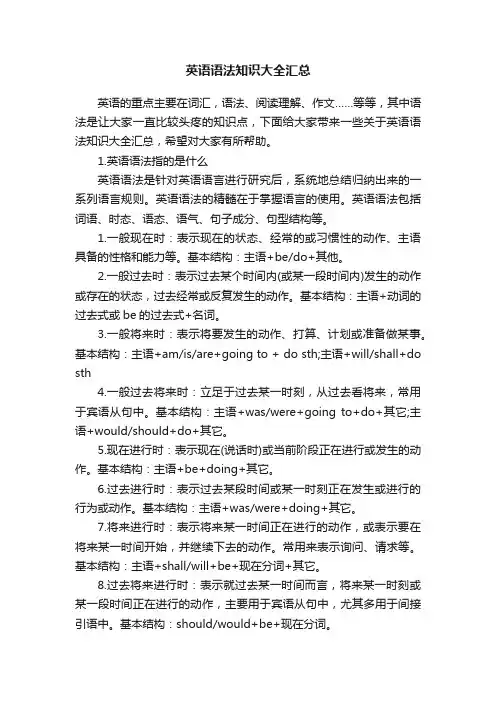
英语语法知识大全汇总英语的重点主要在词汇,语法、阅读理解、作文……等等,其中语法是让大家一直比较头疼的知识点,下面给大家带来一些关于英语语法知识大全汇总,希望对大家有所帮助。
1.英语语法指的是什么英语语法是针对英语语言进行研究后,系统地总结归纳出来的一系列语言规则。
英语语法的精髓在于掌握语言的使用。
英语语法包括词语、时态、语态、语气、句子成分、句型结构等。
1.一般现在时:表示现在的状态、经常的或习惯性的动作、主语具备的性格和能力等。
基本结构:主语+be/do+其他。
2.一般过去时:表示过去某个时间内(或某一段时间内)发生的动作或存在的状态,过去经常或反复发生的动作。
基本结构:主语+动词的过去式或be的过去式+名词。
3.一般将来时:表示将要发生的动作、打算、计划或准备做某事。
基本结构:主语+am/is/are+going to + do sth;主语+will/shall+do sth4.一般过去将来时:立足于过去某一时刻,从过去看将来,常用于宾语从句中。
基本结构:主语+was/were+going to+do+其它;主语+would/should+do+其它。
5.现在进行时:表示现在(说话时)或当前阶段正在进行或发生的动作。
基本结构:主语+be+doing+其它。
6.过去进行时:表示过去某段时间或某一时刻正在发生或进行的行为或动作。
基本结构:主语+was/were+doing+其它。
7.将来进行时:表示将来某一时间正在进行的动作,或表示要在将来某一时间开始,并继续下去的动作。
常用来表示询问、请求等。
基本结构:主语+shall/will+be+现在分词+其它。
8.过去将来进行时:表示就过去某一时间而言,将来某一时刻或某一段时间正在进行的动作,主要用于宾语从句中,尤其多用于间接引语中。
基本结构:should/would+be+现在分词。
9.现在完成时:过去发生或已经完成的动作对现在造成的影响或结果,或从过去已经开始,持续到现在的动作或状态。
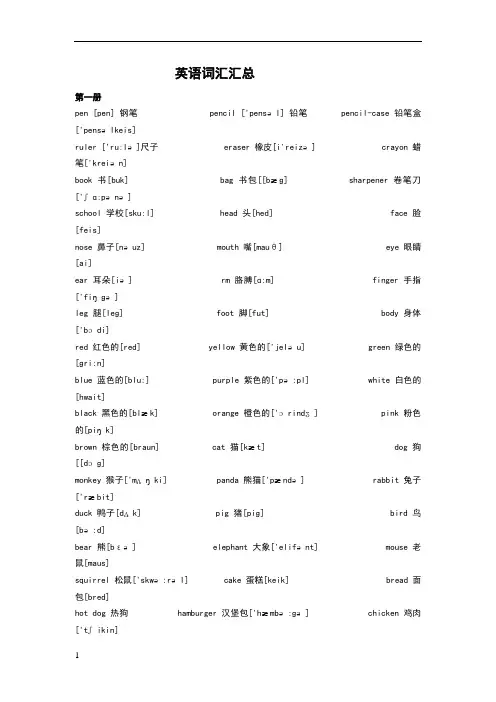
英语词汇汇总第一册pen [pen] 钢笔 pencil ['pensəl] 铅笔 pencil-case铅笔盒['pensəlkeis]ruler ['ru:lə]尺子 eraser 橡皮[i'reizə] crayon 蜡笔['kreiən]book 书[buk] bag 书包[[bæɡ] sharpener 卷笔刀['ʃɑ:pənə]school 学校[sku:l] head 头[hed] face 脸[feis]nose鼻子[nəuz] mouth 嘴[mauθ] eye 眼睛[ai]ear 耳朵[iə] rm胳膊[ɑ:m] finger 手指['fiŋɡə]leg 腿[leɡ] foot 脚[fut] body 身体['bɔdi]red 红色的[red] yellow 黄色的['jeləu] green 绿色的[ɡri:n]blue 蓝色的[blu:] purple 紫色的['pə:pl] white 白色的[hwait]black 黑色的[blæk] orange 橙色的['ɔrindʒ] pink 粉色的[piŋk]brown 棕色的[braun] cat 猫[kæt] dog 狗[[dɔɡ]monkey 猴子['mʌŋki] panda 熊猫['pændə] rabbit 兔子['ræbit]duck 鸭子[dʌk] pig 猪[piɡ] bird 鸟[bə:d]bear 熊[bεə] elephant 大象['elifənt] mouse 老鼠[maus]squirrel 松鼠['skwə:rəl] cake 蛋糕[keik] bread 面包[bred]hot dog 热狗 hamburger汉堡包['hæmbə:ɡə] chicken 鸡肉['tʃikin]French fries 榨薯条 Coke 可乐[kəuk] juice 果汁[dʒu:s]milk 牛奶[milk] water 水['wɔ:tə] tea 茶[ti:]coffee 咖啡['kɔfi] one一[wʌn] two 二[tu:]three 三[θri:] four 四[fɔ:] five 五[faiv]six 六[siks] seven 七['sevən] eight 八[eit]nine 九[nain] ten 十[ten] doll 玩具娃娃[dɔl]boat 小船[bəut] ball 球[bɔ:l] kite 风筝[kait]balloon 气球[bə'lu:n] car 小汽车[kɑ:] plane 飞机[plein]第二册词汇I am (我)是[æm] you 你[ju: ] are (你)是[ɑ: ] love 爱[lʌv]come in. 进来[kʌm] name 名字[neim] class 班[klɑ:s ]good 好的[ɡud] good morning! 早上好! new新的[nju: ] from 从[frɔm] from beijing 从北京来的 we 我们[wi: ]chair 椅子[tʃεə] wall 墙[wɔ:l] ball 球[bɔ:l]box 盒子[bɔks] floor 地板[flɔ:] the capital of China 中国的首都at 在[æt] zoo 动物园[zu:] at the zoo 在动物园里park 公园[pɑ:k] classroom 教室['klɑ:srum] factory工厂['fæktəri]square 广场[skwεə] capital首都['kæpitəl] China 中国['tʃainə]motherland 祖国['mʌðəlænd] has有[hæz] our我们的['auə] national国家的['næʃənəl] cap 帽子[kæp] national flag国旗[flæɡ]coat上衣[kəut] have有[hæv] ong长的[lɔ:ŋ] short短的,矮的[ʃɔ:t] big大的[biɡ] small小的[smɔ:l]or或, 还是[ɔ: ] tall高的[tɔ:l] old年老的[əuld]young年轻的[jʌŋ] hey 嗨[hei] Chinese 中国的;汉语;中国人['tʃai'ni:z]English英国的;英语;英国人['iŋgliʃ] guess 猜[ɡes] over 越(过)['əuvə]there 那儿[ðεə] over there 在那边 American美国的,美国人[ə'merikən]other另外的['ʌðə] an一(个) [æn] apple苹果['æpl]orange桔子['ɔrindʒ] hand手[hænd] egg蛋[eɡ]umbrella 伞[ʌm'brelə] school is over. 放学了 home家[həum]go home 回家 rain 雨;下雨[rein] it's raining. 正在下雨can't 不能 now 现在[nau] much许多[mʌtʃ]how much 多少 eleven 十一[i'levən] twelve十二[twelv]minus 减['mainəs] here这儿[hiə] here youare. 给你money 钱['mʌni] they 他(她,它)们 twenty 二十['twenti]these 这些[ði:z] those 那些[ðəuz] door门[dɔ:]window窗['windəu] picture图画['piktʃə] talk说话,谈论[tɔ:k]about 关于[ə'baut] flower花['flauə] some一些[sʌm]boat 船[bəut] lake 湖[leik] skirt 裙子[skə:t]clean 清洁的[kli:n] shirt (男式)衬衫[ʃə:t] dirty 脏的['də:ti]cup 杯子[kʌp] glass玻璃杯[ɡlɑ:s] picture-book 图画书have a look 看一看 sure 当然,一定[ʃuə] and和[ænd]grade 年级[ɡreid] maths数学[mæθs] your 你们的[jɔ: ]their 他(她,它)们的 [ðεə] pioneer 先锋[,paiə'niə]young pioneer 少年先锋队员 scarf 领巾[skɑ:f] red scarf 红领巾both 两[bəuθ] all全部,都[ɔ:l] peasant农民['pezənt]soldier士兵['səuldʒə] doctor医生[dɔktə] class is over下课了play 玩[plei] there are 有 do做du: ]what are they doing 她们在做什么pingpong 乒乓 right对的[rait]join 参加[dʒɔin] them 他(她,它)们(宾格) [ðem]第三册词汇Paper 纸['peipə] piece片[pi:s] a piece of 一片,一张ink墨水[iŋk] bottle瓶['bɔtl] a bottle of 一瓶water水['wɔ:tə] bread面包[bred] give 给[ɡiv]me我(宾格) [mi: ] please请[pli:z] thank谢谢[θæŋk]want要[wɔ:nt] write写[rait] letter 信['letə]any任何['eni] have you any paper 你有纸吗 Thanks谢谢go去[ɡəu] go to the door 到门那儿去 open开['əupən]close关[kləuz] blackboard黑板['blækbɔ:d]clean把…弄干净[kli:n] football足球['fut,bɔ:l]match比赛[mætʃ] this afternoon今天下午[,ɑ:ftə:'nu:n]between .在(两者)之间[bi'twi:n] time时候[taim] what time 什么时候at three 在三时 but但是[bʌt] jacket外衣,夹克['dʒækit]basketball篮球['bɑ:skitbɔ:l] TV电视 radio 收音机['reidiəu]bat球拍[bæt] maybe也许,可能['meibi] of course 当然[kɔ:s]some一些[sʌm] knife小刀[naif] sorry对不起,抱歉for为[ fɔ: ] can能够[kæn] make做,制作[meik]right now立刻 there is有,存在 picture图画['piktʃə]near 靠近[niə] playground操场['pleiɡraund] model模型['mɔdəl]model plane模型飞机 model ship 模型轮船 sky天空[skai]lake湖[leik] bright明亮的[brait] above 在…上方[ə'bʌv]slogan标语,口号['sləuɡən] world世界[wə:ld] many许多['meni]lesson功课 ['lesən] have lessons上课 like喜欢[laik]table桌子['teibl] let让[let] us 我们(宾格) [ʌs]have a look 看一看 toy玩具[tɔi] fly 飞[flai]house房子[haus] tree 树[tri:] river河流['rivə]dog狗[[dɔɡ] front前面,前部[frʌnt] in front of 在…前面cat猫[kæt] then那么,然后[ðen] cow母牛[kau]behind在..后面[bi'haind] goose鹅[ɡu:s] geese鹅(复数) [ɡi:s]moon月亮[mu:n] air 空气[εə] mountain山['mauntin]think想,认为[θiŋk] so这样,这么,所以['səu]animal动物['æniməl] life 生命,生活[laif] which 哪一个[hwitʃ]nineteen十九[,nain'ti:n] twenty二十['twenti] thirty 三十['θə:ti]twenty-one二十一['twenti'wʌn] thirty-three三十三['θə:ti'θri:]miss 女士,小姐[mis] people 人,人民['pi:pl] family家,家庭['fæmili]day白天[dei] week周,星期[wi:k] today今天[tə'dei]baby婴儿,幼畜['beibi] see看见[si:] zebra斑马['zi:brə]monkey猴子['mʌŋki] run跑[rʌn] jump跳[dʒʌmp]all the time 一直 count数[kaunt] lion狮子['laiən]tiger 老虎['taiɡə] sit坐[sit] exercise练习['eksəsaiz]exercise-book 练习本 out出,在外[aut] out of 向(在)…外面listen听['lisən] read读[ri:d] after在…后面['ɑ:ftə]stop停止[stɔp] wait 等待[weit] evening傍晚,晚上['i:vniŋ]cinema电影院['sinəmə] crossing 十字路口['krɔ:siŋ] light 灯,光['lait]must必须,应该[mʌst] yet还(没有)…还(不)…[jet] o'clock 点钟[ə'klɔk]morning早晨,上午['mɔ:niŋ] get得到[ɡet] up向上[ʌp]get up起床 half半[hɑ:f, hæf] past过[pɑ:st, pæst]morning exercises早操 breakfast早餐['brekfəst] eye-exercises 眼保操have a lesson上课 draw画[drɔ:] clock钟[klɔk]tell 告诉[tel] her 她(宾格) [hə: ] stand站,站立[stænd]ask 问,提问[ɑ:sk] question问题['kwestʃən] other别的['ʌðə]answer 回答['ɑ:nsə] talk in English 用英语交谈 help 帮助[help]quarter四分之一;一刻['kwɔ:tə] game游戏[ɡeim] study学习,研究['stʌdi]supper晚饭['sʌpə] watch观看 [wɔ:tʃ] homework家庭作业['həumwə:k]Mr.先生(mister的缩写) ['mistə] son儿子[sʌn] daughter女儿['dɔ:tə]newspaper报纸['nju:s,peipə] by 在…旁,靠近 story故事['stɔ:ri]story-book故事书 with和…用…[wið] play with 玩…sweep扫[swi:p] floor地板,地面[flɔ:] mop擦,抹,拖[mɔp] ready准备好了['redi] still 还,仍旧[stil] lunch午餐room房间[ru:m] look for 寻找 hurry匆忙,赶紧['hʌri]hurry up! 快点! fox狐狸[fɔks] news消息,新闻[nju:z]down向下[daun] very很,非常['veri] way路[wei]come this way 往这边来 well健康的[wel] away离[ə'wei]run away 跑掉 why (表吃惊,满意等)哎呀!为什么[hwai]第四册board 写字板 [bɔ:d] computer 计算机teacher’s desk 讲台fan扇子,电扇[fæn] classmate同学['klɑ:smeit] good idea好主意[ai'diə]all right好吧,好的 seat座位[si:t] good job 干的好[dʒɔb]what什么[hwɔt] look at 看…… Chinese book 语文书English book 英语书 notebook 笔记本['nəutbuk] too many 太多了fat胖的[fæt] heavy重的;沉重的['hevi] may可以[mei]long hair 长头发[hεə] short hair 短头发 thin 瘦的[θin]strong 健壮的[strɔŋ quiet 安静的['kwaiət] his 他的[hiz]photo 照片['fəutəu] teacher 教师['ti:tʃə] student 学生['stju:dənt]music音乐['mju:zik] science科学['saiəns] sports 体育运动[spɔ:ts]computer game 电脑游戏 painting 绘画['peintiŋ] boy 男孩[bɔi]girl女孩[ɡə:l] bathroom 卫生间['bɑ:θrum] bedroom 卧室kitchen 厨房['kitʃin] fridge 冰箱[fridʒ] key钥匙[ki:]desk 课桌;书桌[desk] rice米饭[rais] noodle(s) 面条['nu:dl]beef 牛肉[bi:f] vegetable 蔬菜['vedʒitəbl] soup汤[su:p]hungry饥饿的['hʌŋɡri] chopsticks 筷子(复数)['tʃɔpstiks]spoon 勺子[spu:n] plate 盘子[pleit] fork 叉子[fɔ:k]pass 传递[pɑ:s] try试一下[trai] helpyourself 随便吃show 展示[ʃəu] food 食物[fu:d] parents 父母['pєərənts]uncle 叔叔;舅舅['ʌŋkl] aunt 姑姑;婶;姨[ɑ:nt] member 成员['membə]only 只有;仅仅['əunli] puppy 小狗['pʌpi] sister 姐妹['sistə]brother 兄弟['brʌðə] father 父亲;爸爸['fɑ:ðə] driver 司机[draivə]farmer 农民['fɑ:mə] nurse 护士[nə:s] it 它[it]class 课程[klɑ:s] dress 连衣裙[dres] T-shirt T恤衫no 不;不是[nəu] not 不;不是的[nɔt] warm 暖和的[wɔ:m]cold 寒冷的[kəuld] cool 凉爽的[ku:l] today 今天[tə'dei]jean 牛仔裤[dʒein] pant 长裤[pænt] socks 袜子[sɔks]shoes 鞋子[ʃu:s] snowy 下雪的['snəui] sunny 晴朗的['sʌni]banana 香蕉[bə'nɑ:nə] pear梨[pεə] watermelon 西瓜['wɔ:təmelənthey她们[ðei] horse 马[hɔ:s] Monday 星期一['mʌndi]Tuesday星期二 ['tju:zdi ] Wednesday星期三['wenzdei ] Thursday ] 星期四['θə:zdi]Friday星期五 ['fraidi] Saturday星期六 ['sætədi] Sunday星期天['sʌndi]第五册robot 机器人['rɔbət] good 好的[gʊd] friend朋友[frend]hear 听,听见[hiə] work工作[wə:k] walk 走路,步行[wɔ:k] excuse me. 对不起!请原谅![iks'kju:z] take 拿,乘[teik] number 号,号码['nʌmbə] take a bus 乘七路公共汽车trolley-bus 无轨电车['trɔlibʌs]underground. 地下火车,地铁['ʌndəgraundby underground 乘地铁 bus stop 公共汽车站[stɔp] catch 赶上;抓住[kætʃ]fish 鱼[fiʃ] bird鸟[bə:d fly飞[flai] swim 游泳[swim]so这样,这么,所以 sing 唱,唱歌[siŋ] dance跳舞,舞蹈['dɑ:ns] speak 说[spi:k] little少许,一点点['litl] a little 少许,一点点owl 猫头鹰[əul] each每个各自的[i:tʃ] each other 互相['ʌðə]begin 开始[bi'gin] much 许多;很,非常[mʌtʃ] like像[laik]so much like 很像 dark 黑暗[dɑ:k] say说sei] after all 究竟,到底 sometimes 有时候['sʌmtaimz] go to bed 去睡觉after school 放学后 often 经常,常常'ɔ:ftən] child小孩[tʃaild]children 小孩(复数) ['tʃildrən] palace宫殿['pælis] a lot of 许多…fun乐趣,娱乐[fʌn] every每个的['evri] early早,早的['ə:li]wash洗[wɔʃ] brush刷(子) [brʌʃ] tooth 牙[tu:θ]teeth牙(复数) [ti:θ] about 关于;大约['əbaut] far 远[fɑ:]usually通常['ju:ʒʊəli] want想要,需要[wɔnt] summer夏天['sʌmə]winter冬季,冬天['wintə] skate 滑冰[skeit ] buy买[bai]size 大小,尺寸,号码[saiz] try试[trai] try on 试穿will将[wil] hare野兔[hєə] tortoise乌龟['tɔ:təs]race比赛[reis] have a race 赛一赛 get到达[get]get there 到那里 got (动词get的过去式) [gɔt]first第一,首先[fə:st] win赢,获胜[win] rest休息[rest]sleep 睡觉[sli:p] fast 快[fɑ:st] Russian俄语,俄国人['rʌʃən]volleyball排球['vɔlibɔ:l] Mr. and Mrs. white 怀特先生和夫人England英国['inglənd] America美国;美洲[ə'merikə]welcome欢迎;受欢迎的['welkəm] how do you do (初次见面)您好!forty四十['fɔ:ti] forty-two四十二 very much 非常only仅仅唯一的['əunli] bell铃,铃声[bel] it's time for 是…的时候了back后面[bæk] at the back 在后面 when什么时候[(h)wen] begin classes 开始上课 time次,次数[taim] month月[mʌnθ] once一次[wʌns] once a week 每周一次 group 组[gru:p] pool 池[pu:l] swimming-pool 游泳池 man男子[mæn] him他(宾格) [him] woman妇女['wumən] her 她(宾格) [hə]bring带来,拿来[briŋ] us 我们(宾格) call 叫[kɔ:l]dad 爸爸[dæd] cabbage卷心菜 ['kæbidʒ] pair 一双[pєə]a pair of 一双… shoe 鞋[ʃu:] yours你的,你们的[juəz]mine我的[main] whose 谁的[hu:z] trousers 裤子,长裤['traʊzəz]a pair of trousers 一条裤子 ours 我们的['auəz] other另外的['ʌðə]theirs他(她,它)们的[ðєəz] wear 穿戴[wεə] blouse (女式)衬衫[blauz]hers 她的[hə:z] ground地面[graʊnd] pick 采,摘[pik]pick up 拾起 empty 空的['empti] basin 盆,脸盆['beisən]put 放into 到…里 really 真地['riəli] may i have a try 我可以试试吗第六册do morning exercises 晨练['mɔ:niŋ] ['eksəsaiz] eat breakfast 吃早饭[i:t] ['brekfəst]have English class上英语课[hæv ] ['iŋgliʃ] [klɑ:s]play sports进行体育运动[plei] [spɔ:ts]eat dinner 吃晚饭['dinə] when 什么时候[(h)wen] evening 夜晚;晚上['i:vniŋ]get up 起床[get] [ʌp] usually 通常;一般['ju:ʒʊəli] noon 中午[nu:n]climb mountains 爬山[klaim] ['mauntins] go shopping 购物;买东西[gəu] ['ʃɔpiŋ]play the piano弹钢琴[plei] [pi'ɑ:nəu ]visit grandparents看望祖父母['vizit] ['græn,pєərənts]go hiking 去远足['haikiŋ] weekend 周末['wi:kend] often 经常['ɔ:ftən]sometimes 有时候['sʌmtaimz] spring 春天[spriŋ] summer 夏天['sʌmə]fall 秋天[fɔ:l] winter 冬天['wintə] season 季节['si:zn]which 哪一个[(h)witʃ] best 最;极[best] swim 游泳[swim]fly kites 放风筝[flai] [kait] skate 滑冰(鞋)[skeit] make a snowman 堆雪人['snəʊmæn]plant trees 种树[plɑ:nt] [tri:s] because 因为[bi'kɔz] sleep 睡觉[sli:p]birthday 生日['bə:θdei] date 日期[deit] draw pictures 画画[drɔ:] ['piktʃəz]cook dinner做饭[kuk] ['dinə] read a book 看书[rid] answer the phone 接电话['ɑ:nsə] [fəun]listen to music听音乐['lisn] ['mju:zik] clean the room打扫房间[kli:n][rum]write a letter写信[rait] ['letə]write an e-mail 写电子邮件 grandpa 爷爷;外公['grændpɑ:]study 书房['stʌdi] kangaroo 袋鼠[,kæŋgə'ru:] sleep 睡觉[sli:p]climb 往上爬[klaim] fight 打架[fait] swing 荡;荡秋千[swiŋ]drink water 喝水[driŋk] ['wɔ:tə] take pictures 照相[teik] ['piktʃəz]watch insects 观察昆虫[wɔtʃ] ['insekt] pick up leaves 采摘树叶[pik] [ʌp] [li:vz]do an experiment [du:] [æn] [iks'perimənt]做实验 catch butterfly 捉蝴蝶[kætʃ] ['bʌtəflai]honey蜂蜜['hʌni] count insects 数昆虫[kaʊnt] ['insekt] collect leaves 收集树叶[kə'lekt]write a report写报告[rait][ri'pɔ:t] play chess下棋[plei][tʃes]have a picnic 举行野餐['piknik]第七册traffic 交通['træfik] traffic light 交通灯[lait] traffic rule 交通规则ru:l]stop 停,停车站[stɔp] wait 等待[weit] get to 到达[get] [tu]library 图书馆['laibrəri] post office 邮局[pəʊst] ['ɔfis] hospital医院['hɔspitl]cinema电影院['sinimə] bookstore 书店['bukstɔ:] where 在哪里,到哪里[(h)wєə]please 请[pli:z] next to 与……相邻[nekst] turn 转弯tə:n]right 右边[rait] left 左边[left] straight 成直线地[streit]then 然后[ðen] next week 下周[wi:k] this morning 今天上午[ðis] ['mɔ:niŋ]this afternoon 今天下午[ðis] ['ɑ:ftə'nu:n] this evening今天晚上[ðis] ['i:vniŋ]comic book 漫画书['kɔmik] [buk] comic连环图画,喜剧的['kɔmik]post card 明信片[pəʊst] [kɑ:d] hobby 爱好['hɔbi] ride a bike→riding a bike骑自行车[raid] dive→diving 跳水[daiv] play the violin→playing the violin 拉小提琴['pleiiŋ] [,vaiə'lin] go→goes 去[gəʊz] make kites→making kites 制作风筝[meik] [kait] live→lives 居住[liv ] [laivz] teach→teaches 教[ti:tʃ] collect stamps→collecting stamps 集邮[kə'lekt] [stæmps] watch→watches看[wɔtʃ] read→reads 读,看[rid] doesn’t=does not [dʌz ]singer 歌唱家,歌手['sindʒə] writer 作家['raitə] actor男演员['æktə] actress女演员['æktris] artist 画家['ɑ:tist] TV reporter 电视台记者[ri'pɔ:tə] engineer工程师[,endʒi'niə] accountant会计[ə'kauntənt] policeman 男警察[pə'li:smən]salesperson销售员['seilz,pə:sən] cleaner清洁工['kli:nə] work 工作[wə:k]cloud 云[klaud] sun 太阳[sʌn] stream 河,溪[stri:m] come from 来自kʌm] [frɔm ]seed 种子[si:d] soil 土壤[sɔil] sprout 苗,芽[spraut] plant 植物,种植[plɑ:nt]should 应该[ʃud ] then 然后[ðen]第八册tall → taller更高的[tɔ:l] short → shorter 更矮的[ʃɔ:t] strong → stronger 更强壮的[strɔŋ]old → older 年龄更大的[əuld] young → younger 更年轻的[jʌŋ] big → bigger 更大的[big]heavy → heavier 更重的['hi:vi] long → longer 更长的[lɔŋ] thin → thinner 更瘦的[θin]small → smaller 体型更小的[smɔ:l] have a fever 发烧[hæv] ['fi:və]have a sore throat 喉咙疼[ sɔ, sɔə] [θrəut] have a cold 感冒[kəuldhave a toothache 牙疼['tu:θeik] have a headache 头疼['hedeik]matter 事情,麻烦'mætə] sore 疼的[ sɔ ] hurt 疼痛[hə:t]tired 疲劳的,累的['taiəd] excited 兴奋的[ik'saitid] angry 生气的['æŋgri]happy 高兴的['hæpi] bored 无聊的,烦人的[bɔ:d] sad 忧伤的,悲伤的[sæd]watch → watched 看[wɔtʃ wash → washed 洗[wɔʃt] clean → cleaned 打扫[kli:n]play → played 玩[plei] visit → visited 看望['vizit]do → did last weekend 上一个周末 go → went 去[gəu] [went] go to a park → went to a park 去公园[pɑ:k]go swimming→went swimmin去游泳['swimiŋ] go fishing → went fishing 去钓鱼['fiʃiŋ]hiking徒步旅行['haikiŋ] go hiking → went hiking 去郊游['haikiŋ] learn Chinese → learned Chinese 学汉语[lə:n] ['tʃai'ni:z] ['lə:nid] sing and dance → sang and danced 唱歌和跳舞[siŋ] ['dɑ:ns]sæŋ] eat good food → ate good food 吃好吃的食物[i:t] [gʊd] [fu:d] [et]take pictures → took pictures 照相[teik] [tuk] climb → climbed 爬klaim] had buy presents → bought presents 买礼物[hæd] [bai] [pri'zent] [ bɔ:t] row划,划船,责骂[rau] row a boat → rowed a boat 划船[rau] [bəut] see elephant → saw elephant 看大象[si:] ['elifənt] [sɔ:]ski滑雪,雪橇[ski go skiing → went skiing 去滑雪[ 'ski:iŋ] skat e溜冰,滑冰[skeit, skit]go ice-skating → went ice-skating 去滑冰[ais] how 怎么,如何[hau]get → got 到达[get] [gɔt] last 上一个的,仅余的,留在最后的[lɑ:st]。
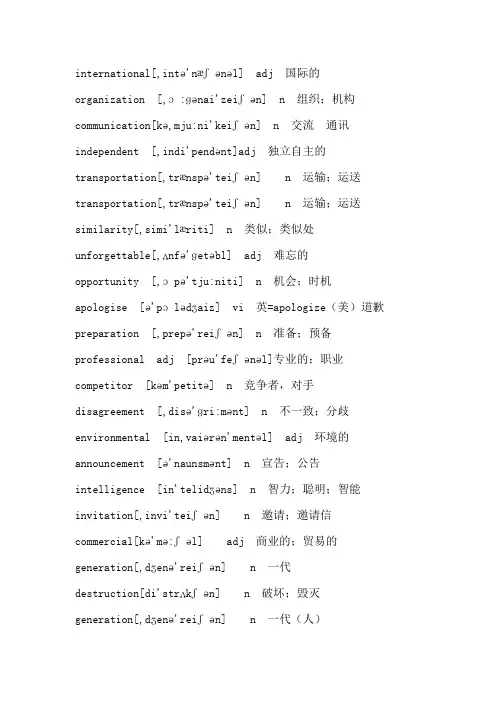
international[,intə'næʃənəl] adj 国际的organization [,ɔ:ɡənai'zeiʃən] n 组织;机构communication[kə,mju:ni'keiʃən] n 交流通讯independent [,indi'pendənt]adj 独立自主的transportation[,trænspə'teiʃən] n 运输;运送transportation[,trænspə'teiʃən] n 运输;运送similarity[,simi'læri ti] n 类似;类似处unforgettable[,ʌnfə'ɡetəbl] adj 难忘的opportunity [,ɔpə'tju:niti] n 机会;时机apologise [ə'pɔlədʒaiz] vi 英=apologize(美)道歉preparation [,prepə'reiʃən] n 准备;预备professional adj [prəu'feʃənəl]专业的;职业competitor [kəm'petitə] n 竞争者,对手disagreement [,disə'ɡri:mənt] n 不一致;分歧environmental [in,vaiərən'mentəl] adj 环境的announcement [ə'naunsmənt] n 宣告;公告intelligence [in'telidʒəns] n 智力;聪明;智能invitation[,invi'teiʃən] n 邀请;邀请信commercial[kə'mə:ʃəl] adj 商业的;贸易的generation[,dʒenə'reiʃən] n 一代destruction[di'strʌkʃən] n 破坏;毁灭generation[,dʒenə'reiʃən] n 一代(人)dormitory['dɔ:mitəri] 宿舍application[,æpli'keiʃən] n 应用,实施, 用途disadvantage [disəd'vɑ:ntidʒ] n 不利;不利条件conclusion[kən'klu:ʒən] n 结束;结论thunderstorm['θʌndəstɔ:m] n 雷雨;雷暴experiment[ik'speriment, ek's-] n 实验;protection[prəu'tekʃən] n 保护;防卫agricultural[,æɡri'kʌltʃərəl] adj 农业的;农艺conference ['kɔnfərəns]n 会议;讨论会humourous ['hju:mərəs] adj (=humorous)富于幽默感的;滑稽的interpretation[in,tə:pri'teiʃən] n 解释;阐明appreciate[ə'pri:ʃieit] vt 赏识;鉴赏;感激attraction[ə'trækʃən] n.吸引人的事物;吸引;吸引力conservation[,kɔnsə'veiʃən] n(自然资源的)保护;管理;保存imagination[i,mædʒi'neiʃən] n 想像(力);空想helicopter['helikɔptə] n 直升(飞)机perspiration[,pə:spə'reiʃən] n.汗水;出汗radioactivity[,reidiəuæk'tivəti] n.放射性;放射现象;放射线misunderstand[,misʌndə'stænd]vt.(misunderstood, misunderst ood)误解;误会observation[,ɔbzə:'veiʃən] n.注意;观察;观测exploration[,eksplɔ:'reiʃən] n.探究;考察;勘探interviewee[,intəvju:'i:] n.被接见者;被采访者; 被面试者introduction[,intrə'dʌkʃən] n.序言;介绍;引进atmosphere['ætmə,sfiə] n.气氛;情绪;大气;大气层stadium['steidiəm] n.(有看台的)露天体育场extraordinary[ik'strɔ:dənəri] adj. 特别的;不平常的;惊人的contribute[kən'tribju:t] vi.作出贡献contemporary[kən'tempərəri] adj.当代的;现代的;consumer[kən'sju:mə] n.消费者;用户;客户definition[,difi'niʃən] n.定义;解释contagious[kən'teidʒəs]adj.(指疾病)接触(传)染的;(情绪等)感染性的motorcycle['məutə,saikl] n.摩托车premier['premjə, pri'miə, 'pri:m-]n.总理;首相responsibility[ɔnsə'biliti] n.责任;责任心;职责cooperation[kəu,ɔpə'reiʃən] n.合作;配合representative[,repri'zentətiv] n.代表;典型;议员explanation[,eksplə'neiʃən]n.解释;说明;阐述thermometer[θə'mɔmitə] n.温度计;体温表sustainable[sə'steinəbl]adj.能持续的;能维持的;能承受的constitution[,kɔnsti'tju:ʃən]n.宪法economic[,i:kə'nɔmik]adj.经济的;经济学的;foundation[faun'deiʃən]n.基础;建立rejuvenate[ri'dʒu:vineit]vt.& vi.(使)恢复(青春)活力;(使)返老还童impressive[im'presiv] adj.给人深刻印象的companion[kəm'pænjən]n.同伴;同伙collision[kə'liʒən] n.碰撞;(利益、意见等)冲突relationship[ri'leiʃənʃip]n.关系;联系;亲属关系demonstration[,demən'streiʃən] n.游行;集会;discrimination[dis,krimi'neiʃən]n.歧视;区别independence[,indi'pendəns] n.独立;自主;unconditional[,ʌnkən'diʃənəl] adj.无条件的arrangement[ə'reindʒmənt]n.安排;unemployment[,ʌnim'plɔimənt]n.失业(状态);失业众人数reconstruction[,ri:kən'strʌkʃən]n.重建;重建物economical[,i:kə'nɔmikəl] adj.经济的;节约的segregation[,seɡri'ɡeiʃən]n.隔离;分离injustice[in'dʒʌstis]n.不公平;非正义financial[fai'nænʃəl]adj.财务的;金融的;disability[,disə'biləti]n.伤残;无能;无力encouragement[in'kʌridʒmənt]n.鼓励;促进accessible[ək'sesəbl]adj.可以使用(或得到)的;能进入的motivate['məutiveit] vt.使有动机;激发background['bækɡraund]n.背景possibility[,pɔsə'biləti] n.可能(性);可能的事connection[kə'nekʃən] n.联系;关系;联结reasonable['ri:zənəbl]adj.合乎情理的;讲理的consequence['kɔnsi,kwəns] n.结果;后果;影响archaeological[,ɑ:kiə'lɔdʒikəl]adj.考古学的archaeologist[,ɑ:ki'ɔlədʒist] n.考古学家decoration[,dekə'reiʃən]n.装饰;装潢requirement[ri'kwaiəmənt]n.需要;规定distinction[dis'tiŋkʃən]n.差别;对比accompany[ə'kʌmpəni]vt.陪伴;陪同investigation[in,vesti'ɡeiʃən] n.调查研究punishment ['pʌniʃmənt]n.惩罚administration[əd,mini'streiʃən]n.管理;行政(机关);经营concentrate['kɔnsəntreit] vi.集中;全神贯注vt.集中;聚集;浓缩rhinoceros[rai'nɔsərəs, ri-] n.犀牛dedication[,dedi'keiʃən] n.忠诚;奉献technological[,teknə'lɔdʒikəl]adj.技术的pronunciation[prəu,nʌnsi'eiʃən]n.发音;发音方式immigration[,imi'ɡreiʃən] n.移民aboriginal[,æbə'ridʒənəl] adj.土著的procedure[prə'si:dʒə]n.步骤;程序;手续identification[ai,dentifi'keiʃən] n.验明;鉴别consideration[kən,sidə'reiʃən]n.考虑;体贴nutritional[nju:'triʃənəl]adj.营养(品)的promotion[prəu'məuʃən]n.(商品等)宣传;推销;促进;提升anniversary[,æni'və:səri] n周年纪念(日)granddaughter['ɡræn,dɔ:tə]n.(外)孙女comprehension[,kɔmpri'henʃən]n.理解(力)fundamental[,fʌndə'mentəl] adj.基本的;根本的prosperity[prɔs'periti]n.繁荣;成功proficiency[prəu'fiʃənsi]n.熟练;精通insurance[in'ʃuərəns] n.保险;保险业;significance[siɡ'nifikəns] n.意义;重要性expectation[,ekspek'teiʃən] n.预料;期待;期望questionnaire[,kwestʃə'nεə, ,kes-] n.问卷;调查表bureaucratic[,bjurəu'krætik]adj.官僚的;官僚制度的contradictory[,kɔntrə'diktəri] adj.互相矛盾的;互相对立的congratulate[kən'ɡrætʃu,leit]vt.祝贺;庆贺combination[,kɔmbi'neiʃən]n.结合;混合物compulsory[kəm'pʌlsəri]adj.义务的;有责任的; 必须做的corporation[,kɔ:pə'reiʃən]n.公司;法人团体presentation [,prezən'teiʃən, ,pri:-] n.描述;介绍;提出transparent[træns'pærənt]adj.透明的enthusiasm[in'θju:ziæzəm] n.热心;热情satisfa ction[,sætis'fækʃən] n.满意;满足competitive[kəm'petitiv]adj.比赛性的;好竞争的tournament['tuənəmənt, 'tɔ:-, 'tə:-] n.联赛;比赛;锦标赛。
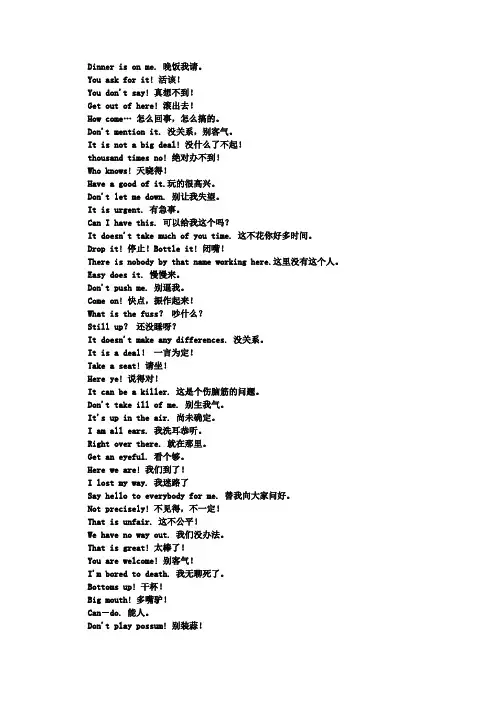
Dinner is on me. 晚饭我请。
You ask for it! 活该!You don't say! 真想不到!Get out of here! 滚出去!How come… 怎么回事,怎么搞的。
Don't mention it. 没关系,别客气。
It is not a big deal! 没什么了不起!thousand times no! 绝对办不到!Who knows! 天晓得!Have a good of it.玩的很高兴。
Don't let me down. 别让我失望。
It is urgent. 有急事。
Can I have this. 可以给我这个吗?It doesn't take much of you time. 这不花你好多时间。
Drop it! 停止!Bottle it! 闭嘴!There is nobody by that name working here.这里没有这个人。
Easy does it. 慢慢来。
Don't push me. 别逼我。
Come on! 快点,振作起来!What is the fuss?吵什么?Still up?还没睡呀?It doesn't make any differences. 没关系。
It is a deal!一言为定!Take a seat! 请坐!Here ye! 说得对!It can be a killer. 这是个伤脑筋的问题。
Don't take ill of me. 别生我气。
It's up in the air. 尚未确定。
I am all ears. 我洗耳恭听。
Right over there. 就在那里。
Get an eyeful. 看个够。
Here we are! 我们到了!I lost my way. 我迷路了Say hello to everybody for me. 替我向大家问好。
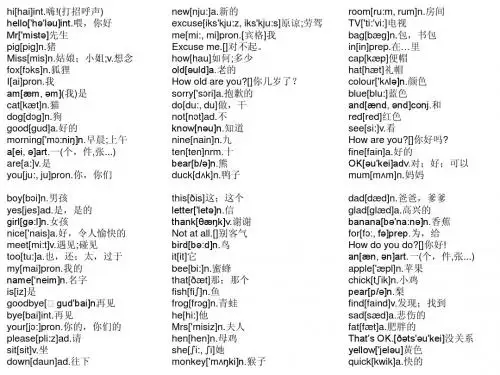
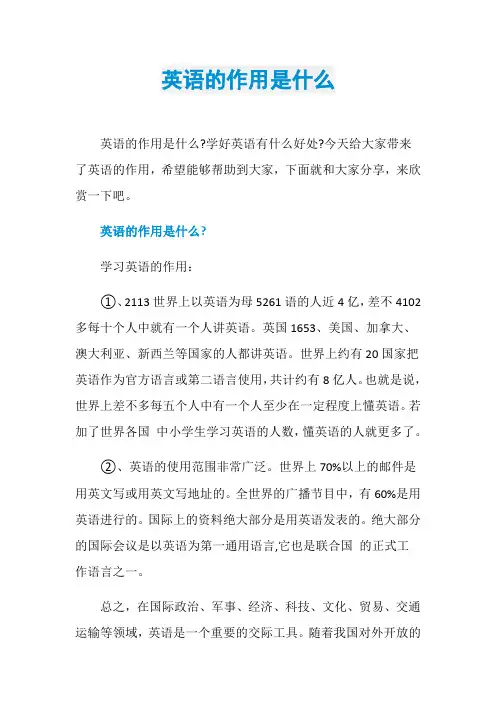
英语的作用是什么英语的作用是什么?学好英语有什么好处?今天给大家带来了英语的作用,希望能够帮助到大家,下面就和大家分享,来欣赏一下吧。
英语的作用是什么?学习英语的作用:①、2113世界上以英语为母5261语的人近4亿,差不4102多每十个人中就有一个人讲英语。
英国1653、美国、加拿大、澳大利亚、新西兰等国家的人都讲英语。
世界上约有20国家把英语作为官方语言或第二语言使用,共计约有8亿人。
也就是说,世界上差不多每五个人中有一个人至少在一定程度上懂英语。
若加了世界各国中小学生学习英语的人数,懂英语的人就更多了。
②、英语的使用范围非常广泛。
世界上70%以上的邮件是用英文写或用英文写地址的。
全世界的广播节目中,有60%是用英语进行的。
国际上的资料绝大部分是用英语发表的。
绝大部分的国际会议是以英语为第一通用语言,它也是联合国的正式工作语言之一。
总之,在国际政治、军事、经济、科技、文化、贸易、交通运输等领域,英语是一个重要的交际工具。
随着我国对外开放的不断扩大化,科技术的不断进步,国际地位的不断提高,迫切需要造就一大批精通外语的专门人才。
因此,学好英语对实现上述目标具有重要大的现实意义和深远的历史意义。
我们需要学习别人的先进技术。
英语也是与电脑联系最密切的语言,大多数编程语言都与英语有联系,而且随着网络的使用,英文的使用更普及。
英语是联合国的工作语言之一。
苏格兰语、低地撒克逊语、丹麦语、德语、荷兰语、南非荷兰语和英语也很接近。
拥有法国血统的诺曼人于11世纪征服英格兰王国,带来数万法语词汇和拉丁语词汇,很大程度地丰富了英语词汇外,相对也驱使不少原生的语汇作废。
扩展资料:现代英语所使用的拼写字母,也是完全借用了26个字母。
所谓“英语字母”,就是古罗马人在书写时所使用的拼写字母。
英语开始以拉丁字母作为拼写系统大约是在公元六世纪盎格鲁撒克逊时代。
当时的传教士们为了把当地语言记录成文字而引进字母,他们所面临的问题是当时的英语共有超过40种不同的音,而拉丁字母无法一一对应,于是他们用增加字母、在字母上加变音符号、两个字母连写等方法来对应不同的发音,之后慢慢形成了古英语用26个拉丁字母+来拼写并伴有一些拼写规则的文字系统。
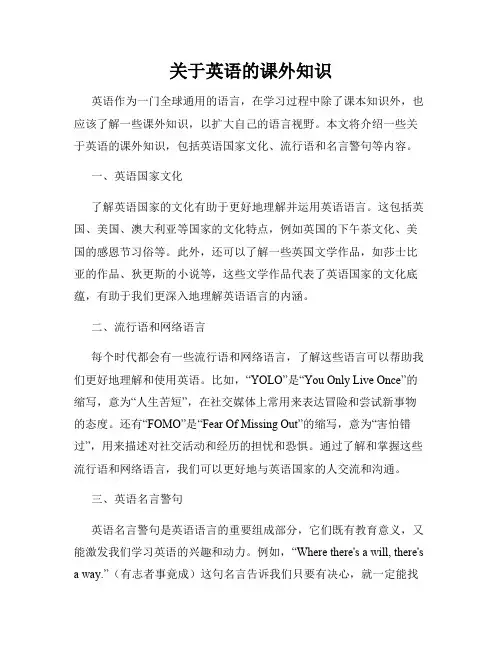
关于英语的课外知识英语作为一门全球通用的语言,在学习过程中除了课本知识外,也应该了解一些课外知识,以扩大自己的语言视野。
本文将介绍一些关于英语的课外知识,包括英语国家文化、流行语和名言警句等内容。
一、英语国家文化了解英语国家的文化有助于更好地理解并运用英语语言。
这包括英国、美国、澳大利亚等国家的文化特点,例如英国的下午茶文化、美国的感恩节习俗等。
此外,还可以了解一些英国文学作品,如莎士比亚的作品、狄更斯的小说等,这些文学作品代表了英语国家的文化底蕴,有助于我们更深入地理解英语语言的内涵。
二、流行语和网络语言每个时代都会有一些流行语和网络语言,了解这些语言可以帮助我们更好地理解和使用英语。
比如,“YOLO”是“You Only Live Once”的缩写,意为“人生苦短”,在社交媒体上常用来表达冒险和尝试新事物的态度。
还有“FOMO”是“Fear Of Missing Out”的缩写,意为“害怕错过”,用来描述对社交活动和经历的担忧和恐惧。
通过了解和掌握这些流行语和网络语言,我们可以更好地与英语国家的人交流和沟通。
三、英语名言警句英语名言警句是英语语言的重要组成部分,它们既有教育意义,又能激发我们学习英语的兴趣和动力。
例如,“Where there's a will, there's a way.”(有志者事竟成)这句名言告诉我们只要有决心,就一定能找到方法克服困难。
还有“Actions speak louder than words.”(行胜于言)这句名言提醒我们行动比言辞更有力量。
通过学习和运用这些名言警句,我们可以提高自己的英语表达能力,并深刻理解其中的智慧和哲理。
四、英语习惯用语和俚语英语中有很多习惯用语和俚语,了解这些表达方式可以让我们在交流时更加地自然和流利。
比如,“break a leg”在演艺圈中表示“祝你好运”,“raining cats and dogs”表示“倾盆大雨”。
常用英语单词500个1.lifetime n.终身2.strength n.力量,力气3.highway n.公路,大路4.ahead adv.在前,向前,提前5.local adj.地方的n.局部6.attend vt.出席,照顾,护理7.farther adv.更远地a.更远的8.speak的过去分词9.target n.靶;目标10.hire vt.雇用11.extra adj.额外的ad.特别地12.librarian n.图书馆馆员13.reality n.现实;真实14.reading n.阅读;读物15.beg vt.vi.乞求,请求16.hard-working adj.勤劳17.distance n.距离,远处18.sum n.总数;金额vi.共计19.gentle adj.和蔼的,轻柔的20.certainly adv.一定,必定,当然21.absence n.缺席,不在场,缺乏22.drunk a.醉的,陶醉的23.sew vt.缝制24.lorry n.卡车25.junior adj.年少的,地位较低的n.晚辈26.adopt vt.收养,采用,采取27.chat vi.n.闲谈,聊天28.pole n.杆,柱29.major vi.主修,专攻a.主要的,多数的n.专业30.poet n.诗人31.shoot vt.发射;射门,投篮n.发芽32.nest n.巢,窝33.determine vt.决定,决心34.calculate vt.计算,估计,计划35.butcher n.屠夫,屠户36.effect n.效果,效力lion num.百万38.mankind n.人类39.gravity n.重力,引力,严重性40.cure vt.医治n.治愈41.bite vt.咬,叮,螫42.shopping n.购物43.recover vt.恢复,痊愈44.possibly adv.可能地,也许45.wind n.风tely adv.最近47.aware adj.知道的,意识到的48.electronic adj.电子的49.painting n.油画;绘画50.scare vt.惊吓vi.受惊51.anyhow adv.无论如何52.signal n.信号vi.发信号53.tradition n.传统,惯例54.kindergarten n.幼儿园55.resist vt.抵抗,抵制56.studio n.工作室,播音室57.disappoint vt.使失望58.edit vt.编辑,编纂,校订59.sink vi.下沉,降低n.水槽,水池60.postcode n.邮递区号61.bench n.长凳,条凳,工作台62.regular adj.规则的,整齐的;定期的,常规的63.splendid adj.壮丽的,显著的64.intelligence n.智力,理解力,情报65.dirt n.尘,土,污垢66.trend vi.伸向;倾向n.倾向67.manner n.方式,态度;礼貌68.reform n.改革,改良vt.改革,革新69.wire n.金属线,电缆70.generous adj.慷慨的,宽厚的71.flood n.洪水72.immediate adj.立即的,直接的b n.梳子vt.梳理74.flame n.火焰,光辉,热情75.spot vt.认出,发现n.点,斑点;地点76.damp adj.潮湿的77.digital adj.数字的78.cash n.现金,现款ck vt.缺乏,不足n.短缺的东西80.oppose vt.反对,反抗81.misunderstand vt.误解,误会82.republic n.共和国83.importance n.重要性84.musical adj.音乐的85.valuable adj.值钱的,有价值的n.贵重物品86.attempt vt.尝试,试图n.企图87.function n.功能,职务,函数88.root n.根(部);根源vi.生根,扎根89.needle n.针vt.缝补,编织90.trap n.陷阱;诡计vt.诱骗91.television n.电视,电视机92.overcome vt.战胜,克服93.cattle n.牛,牲口,家畜94.decrease vi.n.减少95.grocer n.杂货商96.outer adj.外部的,外面的97.scientific adj.科学的98.tobacco n.烟草,烟叶99.nephew n.侄子,外甥100.check n.支票101.actual adj.实际的,现行的102.loose adj.宽松的;自由的103.devote vt.将…奉献,致力于104.defeat vt.战胜,击败105.illegal adj.非法的106.exhibition n.展览,陈列,展览会107.frequent adj.经常的108.album n.集邮本,照相簿,唱片109.conduct n.举止,行为,指导110.damage vt.损害,毁坏n.损害111.socialist adj.社会主义的112.drawing n.绘画113.throughout prep.遍及ad.到处114.pure adj.纯洁的115.constant adj.经常的,永恒的116.degree n.程度,度,学位117.crowd n.群,大众,一伙人118.meanwhile adv.同时,当时119.grasp vt.抓紧,掌握n.抓120.stage n.舞台;阶段,时期121.blouse n.宽松的上衣122.remove vt.移动;搬迁123.movement n.动作;活动;移动124.button n.扣子,按钮vt.扣紧125.employ vi.雇用126.fortune n.命运,运气,财产127.victim n.牺牲者,受害者128.revise vt.校订,修改129.title n.标题,题目;称号,头衔130.tyre n.轮胎131.challenge n.挑战132.purchase vt.购买n.购买;赃物133.income n.收入,收益134.anniversary n.周年纪念日135.brick n.砖块136.bath n.洗澡,浴缸137.pence n.penny的复数138.onto prep.到…上139.equipment n.装备,设备,配备140.nut n.坚果141.argue vi.争论,争辩,辩论142.multiply vt.增加;乘143.independent adj.独立的,自主的144.trick n.诡计;窍门vt.哄骗145.cream n.奶油146.nuclear adj.原子核的;核心的147.access n.接近,通道,入口148.voyage n.航海vi.航海,航空149.blanket n.毯子150.federal adj.联邦的,联盟的151.birthplace n.出生地152.cupboard n.碗柜153.content adj.满意的,满足的154.thief n.窃贼,偷窃犯155.adult n.成年人adj.成年的156.jam n.果酱157.owe vt.欠;归功于158.remark vi.评论n.评论;备注159.finance n.财政,金融,财源160.interpret vt.解释,说明,口译161.extremely adv.极其,非常pete vi.比赛,竞争,对抗163.register vt.登记,注册n.登记,注册164.focus vi.聚焦,注视n.焦点165.centimeter n.厘米166.hunt n.vt.打猎,搜寻167.liquid n.液体a.液体的,流动的168.distant adj.在远处的,疏远的169.willing adj.心甘情愿的170.relate vt.联系171.wipe vt.揩,擦n.揩,擦172.revolution n.革命;旋转173.mobile adj.运动的,移动的174.harm n.伤害,损害vt.损害175.reserve vt.储备,保留;预定176.lightning n.闪电177.actor n.男演员178.temporary adj.暂时的,临时的179.reception adj.接待;接待处180.fasten vt.扎牢,扣住,使固定181.declare vt.断言,声明182.valley n.山谷,流域183.shelter n.掩蔽处vt.遮蔽,掩护184.aim vi.瞄准,针对,致力185.engine n.发动机,引擎186.niece n.侄女,外甥女187.consist vi.由…组成188.dictation n.口授189.greatly adv.大大地,非常地;伟大地,崇高地190.arrest vt.逮捕,拘留191.explore vt.vi.探险,探索192.repeat vt.重说,重做n.重复193.journey n.旅行,旅程194.surround vt.包围,环绕195.shock n.冲击;震惊;电击vi.震动196.dial n.钟面,拨号盘vt.拨号197.stair n.楼梯198.motor n.发动机,机动车199.cock n.公鸡,龙头plex adj.结合的,复杂的201.unique adj.唯一的202.flash n.闪光vi.闪,闪烁203.mathematics n.数学204.understanding n.理解,理解力205.steam n.蒸汽vi.蒸发vt.蒸煮206.exit n.出口,退场vi.退出207.better adj.较好的ad.更好地208.sheet n.被单;纸张,薄片209.desert n.沙漠vt.离弃,擅离210.shore n.滨,岸211.brief adj.简短的vt.作简报212.deserve vt.应受,值得213.lung n.肺214.port n.港口215.pain n.痛苦;疼痛216.waiter n.侍者,服务员217.shadow n.阴影,影子218.fairly adv.相当,公平地219.navy n.海军220.reject vt.拒绝;丢掉;驳回221.petrol n.汽油222.grain n.谷物,谷粒,颗粒223.eager adj.渴望的,热切的224.audience n.听众,观众225.candidate n.候选人,投考者226.relevant adj.有关的;中肯的227.united adj.一致的;联合的228.exchange vt.交换,交流n.交换229.soul n.灵魂,精神;人230.struggle n.斗争;奋斗vi.斗争;奋斗231.flow vi.流动,飘扬,涨潮232.perform vt.执行;演出233.dislike vt.n.不喜爱,厌恶234.wave n.波,波涛;起伏vi.波动;挥手235.grand adj.宏伟的,重大的236.alcohol n.酒精,乙醇237.bleed vi.流血238.fierce adj.凶猛的,狂热的239.insect n.昆虫240.globe n.地球,世界,地球仪241.collar n.衣领242.admit vt.承认,准许…进入243.wild adj.野生的;野蛮的n.荒地244.obey vt.顺从vi.服从245.skin vt.剥皮n.皮,皮肤;兽皮246.demand vt.要求,需要247.envy vt.n.妒忌,羡慕248.settle vt.安排,安放;解决vi.定居249.mix vt.使混合;混淆250.fond adj.喜爱的,溺爱的251.insert vt.插入,嵌入252.disaster n.灾难253.downtown adv.在市区,往市区254.favor n.好感,赞同,恩惠fort n.舒适,安慰vt.安慰256.artist n.艺术家,美术家257.curious adj.好奇的,稀奇古怪的258.balance vt.使平衡,称n.天平259.measure vt.量,测量n.测量;措施260.amuse vt.逗…乐,给…娱乐261.folk n.人们,家属,亲属262.headmaster n.英国中小学校长,男舍监263.respect vt.尊敬,尊重n.尊敬264.belong vi.属于,附属265.universe n.宇宙,世界266.calm adj.平静的267.upward adj.向上的,上升的ad.向上,往上268.housewife n.家庭主妇269.float vi.漂浮vt.使漂浮rm vt.通知,向…报告271.ceremony n.典礼,仪式,礼节272.tend vi.走向,趋向273.hammer n.锤子vt.锤击274.fur n.软毛,毛皮,裘皮275.chief adj.主要的,首席的276.defence n.防御,辩护277.noisy adj.嘈杂的,喧闹的278.agent n.代理人,代理商279.permit vt.允许n.执照,许可证280.broad adj.宽的,阔的,广泛的281.potential adj.潜在的n.潜能282.continent n.大陆,洲283.variety n.多样化,种类284.socialism n.社会主义285.tank n.坦克;大容器286.debate n.vi.争论,辩论287.panic n.恐慌,惊慌288.weed n.杂草,野草vi.除草289.expense n.花费,消费,费用edy n.喜剧,喜剧场面291.billion num.十亿292.accurate adj.准确的,正确无误的293.explode vt.使爆炸vi.爆炸294.gradual adj.逐渐的,渐进的295.envelope n.信封,封套296.exploit vt.剥削,利用,开拓297.cage n.笼,鸟笼,囚笼298.uniform adj.一样的n.制服299.soil n.土壤;土地300.arrival n.到达,到达者301.honey n.蜜,蜂蜜,甜,甜蜜302.satellite n.卫星303.operate vi.操作;施行手术304.political adj.政治上的305.expand vt.扩大,使膨胀306.reply vi.回答,答复n.答复307.relative adj.有关系的;相对的n.亲戚,亲属308.wooden adj.木制的;呆板的309.maximum n.最大量a.最大的310.afterward(s)adv.后来,以后,随后311.timetable n.时间表;时刻表312.document n.公文,文件313.account n.记述,解释,账目314.sunset n.日落315.suitable adj.适宜的;恰当的316.literature n.文学(作品)317.border n.边缘,边界318.persuade vt.说服319.exist vi.存在,生存320.attitude n.态度,看法,姿势321.astonish vt.使惊讶,使吃惊munism n.共产主义323.fluent adj.流利的,流畅的324.litre n.公升325.waitress n.女侍者,女服务员326.depth n.深度,深处327.recommend vt.推荐328.wedding n.婚礼329.virus n.病毒330.matter n.事情;物质vi.要紧,有关系331.staff n.全体工作人员332.suck vt.吸,吮333.bury vt.埋葬,埋藏334.fellow n.人,家伙,伙伴335.generally adv.一般地,通常地336.evaluate vt.评价,估…的价337.sharp adv.(时刻)整a.锋利的;敏锐的;刺耳的338.jungle n.丛林,密林339.urgent adj.紧急的340.contain vt.包含,容纳341.various adj.各种各样的342.haircut n.理发;发型,发式343.load vt.装,装满n.负载;负担344.charge vt.索价,控告n.费用345.male adj.男的,雄的346.select vt.选择vi.挑选347.stare vi.凝视348.export vt.输出,出口349.particular adj.特殊的,特定的350.arrival n.到达,到达者351.evidence n.根据,证据,证人352.rescue vt.援救,营救353.confident n.确信的,自信的354.range vi.变动,变化n.范围355.whisper vt.低声地讲vi.低语n.耳语,私语356.ash n.灰,灰末,骨灰357.track n.行踪,路径;轨道358.billion num.十亿359.represent vt.描绘;代表,象征ually adv.通常361.characteristic adj.特有的n.特性362.guide n.导游vt.指导363.flour n.面粉,粉末364.accuse vt.指责,归咎于365.aspect n.方面,样子,外表366.salary n.薪水367.cycle n.循环368.pump n.泵vt.用泵抽,打气369.tense adj.紧张的;拉紧的n.时态370.rob vt.抢劫,劫掠vi.抢劫,劫掠371.crew n.全体船员372.sincerely adv.真诚地373.handle n.柄,把手vt.处理374.native adj.本土的n.本地人375.tax n.税(款)vt.征税376.teenager n.青少年377.recycle vt.重复利用378.novel n.小说a.新奇的,新颖的379.annoy vt.使恼怒,打搅380.contribute vt.捐献,捐助,投稿381.delay vt.推迟,耽搁,延误382.strike vt.打,击;罢工n.罢工;打击;mittee n.委员会384.dawn n.黎明,开端385.distinguish vt.区别,辨别386.mountainous adj.多山的387.tear n.泪滴,眼泪vt.撕开,撕裂388.anxious adj.忧虑的,渴望的389.liquid n.液体a.液体的,流动的390.defend vt.保卫,防守391.repair vt.修理,修补n.修理392.throat n.咽喉393.channel n.海峡,渠道,频道mercial adj.商业的,商品化的395.sneaker n.鬼鬼祟祟做事的人,卑鄙者,运动鞋396.within prep.在…里面;不超过397.pillow n.枕头398.noble adj.高尚的n.贵族399.harvest n.收获,收成vt.收割400.oral adj.口头的401.unknown adj.未知的,不知名的402.loss n.遗失;失败;损失403.diamond n.钻石,菱形404.tractor n.拖拉机405.ignore vt.不顾,不理,忽视406.ordinary adj.平常的,平凡的407.beard n.胡须,络腮胡子408.detect vt.察觉,发觉,侦察409.project n.计划;工程;项目vi.伸出vt.设计,规划410.cushion n.垫子,坐垫,靠垫411.telegraph n.电报(机)v.发电报412.chimney n.烟囱413.hunger n.饥饿,渴望414.liberate vt.解放,释放415.participate vi.参与,参加416.stadium n.露天大型运动场417.passive adj.被动的,消极的panion n.同伴419.mass n.大量;群众420.best adj.最好的421.process n.过程vt.处理422.badly adv.坏,差,严重地423.rank n.军衔vt.归类于424.chapter n.章,回,篇425.emergency n.紧急情况,突然事件426.host n.主人,东道主427.event n.事件,事变428.disadvantage n.缺点,弱点429.infer vt.推论,推断,猜想430.luggage n.行李,皮箱431.original adj.最初的;新颖的n.创新432.bargain n.交易vi.议价,成交433.well-known adj.众所周知的434.anniversary n.周年纪念日435.carrot n.胡萝卜436.charge vt.索价,控告n.费用437.boil vi.沸腾,汽化vt.煮沸438.production n.产品;产量439.entrance n.入口,进入440.worst adj.最坏的ad.最坏地441.essay n.短文,散文,小品文442.approach vt.向…靠近n.靠近443.attack vt.vi.n.攻击,进攻444.tap vt.轻打,轻敲n.塞子,龙头;轻叩,轻拍445.former adj.在前的n.前者446.majority n.多数447.gas n.煤气,气体448.rent n.租金,租vi.出租449.self n.自我,自己450.shallow adj.浅的,浅薄的n.浅滩451.painful adj.痛苦的452.outdoor adj./ad.户外的,野外的453.symbol n.象征;符号454.remind vt.提醒455.playmate n.玩伴,游伴456.tight adj.紧的;紧身的ad.紧紧地457.affair n.事情,事件,事务458.request n.请求,要求vt.请求,要求459.happiness n.幸福;满足460.nowhere adv.任何地方都不461.flight n.航班,飞行,逃跑462.suit n.起诉,诉讼vt.适合463.pot n.锅464.whistle n.口哨vi.吹口哨465.dusty adj.多灰尘的,灰蒙蒙的;粉末状的;灰色的466.debt n.债务,欠债467.moral adj.合乎道德的n.道德,品行468.upset vt.使不适,使心烦n.混乱469.per prep.每,每一470.style n.风格,式样471.puzzle n.难题;谜vi.使迷惑472.delete vt.删除,擦掉473.angle n.角,角度474.occupy vt.占领,占有;忙碌475.steady adj.稳固的vt.使稳定476.opera n.歌剧477.pretend vt.假装,装作vi.假装478.graduation n.毕业479.slight adj.细长的;轻微的480.blank adj.空白的n.空白481.outstanding adj.突出的,杰出的482.explanation n.解释,说明,辩解483.found vt.创立,创办484.fist n.拳头485.accordingly adv.因此,依照486.phenomenon n.现象487.frequently adv.时常,频繁地488.tip vt.轻击vi.给小费n.小费489.ripe adj.成熟的;时机成熟的490.forecast n.预测,预报vt.预示491.legal adj.合法的492.volunteer n.志愿者vt.志愿493.reputation n.名誉,声望494.shot n.射击,发射;投篮495.academic adj.学院的,学术的496.topic n.题目;论题,话题497.forever adv.永远,总是,老是 adj.净的,纯的n.网,网状物499.absorb vt.吸收,使专心500.responsible adj.有责任的;尽责的。
v动词n名词Adj形容词Adv副词Prep介词practise v. 练习city n. 城市parent n. 父;母(pl. parents 父母)can v. aux 能够basketball n. 篮球piano n. 钢琴tennis n. 网球table tennis 乒乓球ride v. 骑;开(车)horse n. 马welcome v. 欢迎international adj. 国际的factory n. 工厂hotel n. 饭店;宾馆university n. 大学hospital n. 医院office n. 办公室doctor n. 医生worker n. 工人manager n. 经理photo n. 照片family n. 家庭television n. 电视right adj. 正确的science n. 科学;科学课lab (= laboratory) n. 实验室building n. 建筑物aunt n. 姨;伯母; 婶母; 舅母; 姑母grandparent n. (外)祖父;(外)祖母uncle n. 叔叔;伯伯;舅舅;姑父;姨父sister n. 姐;妹have v. 有email n. 电子邮件healthy adj. 健康的drink n. 饮料v. 喝Fruit n. 水果vegetable n. 蔬菜favourite adj. 最喜欢的team n. 队伍evening n. 晚上idea .想法;主意invite v. 邀请on adj. 进行;上演magic n. 魔术show n. 表演day n. 日子;白天place n. 地点price n. 价格theatre n. 剧院moment n. 时刻swimming n. 游泳come v. 来today adv. 今天plan n. 计划playground n. 操场stay v. 停留game n. 游戏talk v. 谈论time n. 时间history n. 历史at prep. 在(某时间或时刻)start v. 开始get up 起床have v. 吃breakfast n. 早饭house n. 房子;住宅break n. (课间)休息lunch n. 午饭or conj. 或者go home 回家dinner n. 晚饭;正餐finish v. 结束;完成park n. 公园housework n. 家务劳动different adj. 不同的habit n. 习惯always adv. 总是;一直card n. 卡片present n. 礼物usually adv. 通常often adv. 经常never adv. 从不get v. 得到send v. 发送ticket n. 票pair n. 双;对concert n. 音乐会box n. 盒子silk n. 丝绸shirt n. 衬衫magazine n. 杂志novel n. 小说CD n. (= compact disk) 光盘choose v. 选择,挑选lot 大量;许多lots of 大量;许多a lot of 大量;许多clothes n. 衣服(总称)music n. 音乐singer n. 歌手on prep. 通过,以……方式on television 通过电视;在电视上its 物主代词它的think v. 想,认为think of 想出trip n. 旅行zoo n. 动物园tiger n. 老虎camel n. 骆驼elephant n. 大象lion n. 狮子giraffe n. 长颈鹿kangaroo n. 袋鼠monkey n. 猴子panda n. 熊猫snake n. 蛇wolf n. 狼polar bear 北极熊guide n. 导游thousand num. 千visit v. 参观;访问n. 参观;访问every adj. 每一个/只animal n. 动物zebra adj. 斑马more adj. 更多Australia n. 澳大利亚Australian adj.澳大利亚的Arctic n. 北极Europe n. 欧洲European adj. 欧洲的Asia n. 亚洲Asian adj.亚洲的here adv. 在这里bamboo n. 竹子Africa n. 非洲African adj.非洲的America n. 美洲;美国American adj.美洲的;美国的;美国人的Oceania n. 大洋洲Oceanian adj.大洋洲的desert n. 沙漠forest n. 森林jungle n. 热带雨林grass n. 草grassland n.草原(India n. 印度leaf n. 叶子(pl. leaves)world n. 世界computer n. 电脑;主机keyboard n. 键盘monitor n. 显示器mouse n. 鼠标;老鼠print v. 打印printer n. 打印机connect v. 连接switch v. 用开关把……开启(或关掉)Switch on 接通;开(电灯、机器等)finally adv. 最后first adv. 首先document n. 文件use v. 使用click v. 点击next adv. 然后;其次save v. 保存;挽救box n. 方框then adv. 然后again adv. 再一次;又online adj. 在线的travel n. 旅行download v. 下载Internet n. 网络grandchild n. (外)孙子;(外)孙女sometimes adv. 有时候;不时check v. 检查train n. 火车timetable n. 时刻表laptop n. 笔记本电脑weekend n. 周末website n. 网站London n. 伦敦information n. 信息Kind n. 种类subject n. 科目buy v. 买call v. 打电话drive v. 开车enjoy v. 享受lie v. 躺下shop v. 逛商店;购物take v. 获得;拿;抓Take photos 拍照tell v. 讲;告诉Wait v. 等for prep. 为,为了wait for 等待;等候postcard n. 明信片the Great Wall 长城really adv. (表语气)真的吗a good time 美好时光a lot 非常anyway adv. 转换话题结束谈话时说无论如何,反正car n. 小汽车put on 穿上thing n. 事情;东西leave v. 离开work n. & v. 工作at home 在家pub n. 酒馆restaurant n. 饭馆opera n. 歌剧ballet n. 芭蕾舞sleep v. & n. 睡觉wash v. 洗;洗涤dress v. 穿衣服start n. & v. 开始midday n. 正午hot dog 热狗coffee n. 咖啡see v. 探望;看见greeting n. 问候;致意at the moment 现在,此时look at 看……soon adv. 立刻;不久love n. & v. 爱;热爱See you later. 再见。
英语词汇表注:n 名词 v 动词 adj形容词adv 副词 prep介词 conj连词phr.短语 num数词 pron 代名词第一册 1----8331 what [hwɔt] pron 什么2 is [iz] v 是3 what's [hwɔts] what is 的缩写形式4 your [juə] pron 你的,你们的5 name [neim] n 名字6 my [mai] pron 我的7 I [ai] pron 我8 am [æm] v 是9 I'm [aim] I am 的缩写形式10 in [in] prep 在...里(内,上)11 row [rəu] n (一)排,(一)行12 one [wʌn] num 一13 number ['nʌmbə] n 数字,号码14 two [tu:] num 二15 too [tu:] adv 也16 three [θri:] num 三17 are [ɑ:] v 是18 you [ju:] pron 你,你们19 yes [jes] adv 是20 four [fɔ:] num 四21 five [faiv] num 五22 no [nəu] adv & adj 不,不是23 not [nɔt] adv 不24 hi [hai] int 喂(问候或唤起注意)25 class [klɑ:s] n (学校里的)班级,年级26 grade [greid] n 年级27 six [siks] num 六28 seven ['sevn] num 七29 eight [eit] num 八30 nine [nain] num 九31 ten [ten] num 十32 zero ['ziərəu] num & n 零33 plus [plʌs] prep 加,加上34 it [it] pron 它35 It's [its] it is 的缩写形式36 how [hau] adv (指程度)多少,怎样37 old [əuld] adj ...岁的,老的38 eleven [i'levn] num 十一39 twelve [twelv] num 十二40 minus ['mainəs] prep减,减去41 thirteen ['θə:ti:n] num 十三42 fourteen ['fɔ:'ti:n] num 十四43 fifteen ['fif'ti:n] num 十五44 hello [hə'ləu] int喂(问候或唤起注意)45 please [pli:z] int 请46 can [kæn] v.aux 能,可以,会47 spell [spel] v 拼写48 that [ðæt] pron 那,那个49 secret ['si:krit] n 秘密50 this [ðis] pron 这,这个51 in [in] prep 用...(表达)52 English ['iŋgliʃ] n & adj 英语,英国人53 in English [in'iŋgliʃ] phr.用英语(表达)54 a [ei] art 一(个,件...)55 clock [klɔk] n 钟56 and [ænd] conj 和,又,而57 pencil-box ['penslbɔks] n 铅笔盒58 an [æn] art 一(个;件.)59 pencil ['pensl] n 铅笔60 ruler ['ru:lə] n 尺子61 pen [pen] n 钢笔62 sharpener ['ʃɑ:pənə]n 卷笔刀63 eraser [i'reisə] n 橡皮擦64 room [ru:m] n 房间65 book [buk] n 书66 m ap [mæp] n 地图67 desk [desk] n 书桌68 cup [kʌp] n 杯子69 bag [bæg] n 书包70 computer[kəm'pju:tə]n电脑,电子计算机71 mouse [maus]n 鼠,耗子,鼠标72 bed [bed] n 床73 keyboard ['ki:bɔ:d] n 键盘74 isn't ['iznt] is not 的缩写形式75 pear [pɛə] n 梨76 cake [keik] n 蛋糕,饼,糕77 banana [bə'nɑ:nə] n 香蕉78 apple ['æpl] n 苹果79 orange ['ɔ:rindʒ] n 橙子,橘子80 egg [eg] n 蛋81 bike [baik] n 自行车82 bus [bʌs] n 公共汽车83 car [kɑ:] n 汽车,小汽车84 jeep [dʒi:p] n 吉普车85 Chinese['tʃai'ni:z]adj中国的,中国人的;n中国人,汉语86 Japanese[,dʒæpə'ni:z]adj日本的,日本人n日本人,日语87 look [luk] v 瞧,看88 who [hu:] pron 谁89 she [ʃi:] pron 她90 he [hi:] pron 他91 bird [bə:d] n 鸟92 Its [its] pron 它的93 do[du:]v.(构成否定句,疑问句的助动词)94 don't [dəunt] do not 的缩写形式95 know [nəu] v 知道,懂得96 think [θiŋk] v 想,认为97 Mr=mister ['mistə] n 先生(用于姓名前)98 very ['veri] adv 很,非常99 picture ['piktʃə] n 图画,照片100 Mrs ['mɪsɪz] n 夫人101 boy [bɔi] n 男孩102 girl [gə:l] n 女孩103 woman ['wumən] n 妇女,女人104 man [mæn] n 男人,人105 cat [kæt] n 猫106 his [hiz] pron 他的107 teacher ['ti:tʃə] n 教师108 her [hə:] pron 她的109 everyone ['evriwʌn] pron 每人,人人110 here [hiə] adv 这里,这儿111 today [tə'dei] adv & n 今天112 at [æt] prep 在113 school [sku:l] n 学校114 at school phr. 在学校115 sorry ['sɔri] adj 对不起,抱歉的116 where [hwɛə] adv 在哪里117 home [həum] n 家118 at home phr. 在家119 How are you?你(身体)好吗?120 fine [fain] adj (身体)好的121 thanks [θæŋks] n 谢谢(只用复数)122 OK adv (口语)好,对,不错,可以123 thank [θæŋk] v 谢谢124 goodbye [,gud'bai] int 再见,再会125 bye [bai] int 再见126 parrot ['pærət] n 鹦鹉127 sister ['sistə] n 姐,妹128 father ['fɑ:ðə] n 父亲129 mother ['mʌðə] n 母亲130 box [bɔks] n 盒子,箱子131 excuse [iks'kju:z] v 原谅132 me [mi:] pron 我133 Here you are 给你134 but [bʌt] conj 但是135 these [ði:z] pron 这些136 they [ðei] pron 他(她,它)们137 good [gud] adj 好的138 those [ðəuz] pron 那些139 boat [bəut] n 船140 hill [hil] n 小山141 tree [tri:] n 树142 their [ðɛə] pron 他们(她们,它们)的143 much [mʌtʃ] adv 多,很,非常144 very much phr. 很,非常145 all [ɔ:l] adv 都,完全146 right [rait] adv & adj 对的,正确的147 all right phr. 好,行,不错148 mum [mʌm] n (口语)妈妈149 friend [frend] n 朋友150 brother ['brʌðə] n 兄,弟151 nice [nais] adj 令人愉快的152 to [tu:] prep (表示方向)到,向动词不定式符号153 meet [mi:t] v 见面,会面,遇见154 child [tʃaild] n 小孩155 children['tʃildrən] n child的复数形式156 welcome ['welkəm] v 欢迎157 our ['auə] pron 我们的158 come [kʌm] v 来159 come in phr. 进来,进入160 morning ['mɔ:niŋ] n 早晨,上午161 class [klɑ:s] n 同一个班的学生162 on [ɔn] prep 在,在...上163 duty ['dju:ti] n 职责,责任164 on duty phr. 值日165 we [wi:] pron 我们166 aren't [ɑ:nt] are not 的缩写形式167 have [hæv] v 有168 new [nju:] adj 新的169 student ['stju:dənt] n 学生170 twin [twin] n 双胞胎之一171 look [luk] v 看上去,显得172 the [ðə] art 这(那)个,这(那)些173 same [seim] adj 同样的,同一的174 look the same phr. 看起来很像175 America [ə'merikən]n & adj美国人(的) 176 sit [sit] v 坐177 down [daun] adv 向下178 sit down phr. 坐下179 over ['əuvə] adv 在那边,在另一边180 there [ðɛə] adv 那里,那儿181 over there phr. 在那边182 after ['ɑ:ftə] prep 在..以后,在..后面183 look after phr. 照顾,照看184Miss[mis]n女士,小姐(对未婚妇女的称呼) 185 way [wei] n 路,道路186 This way,please. 请走这边187 put [put] v 放188 coat [kəut] n 外套,上衣189 them [ðem] pron 他(她,它)们190 washroom ['wɔʃrum] n 盥洗室,厕所191 let [let] v 让192 us [ʌs] pron 我们193 let's [lets] let us 的缩写形式194 go [gəu] v 去195 Let's go 我们一起去196 classmate ['klɑ:smeit] n 同班同学197 nice [nais] adj 好的,漂亮的198 love [lʌv] v 爱,喜爱199 No ['nʌmbə] n number 的缩写形式200 middle ['midl] adj 中间的,中级的201 middle school n 中学202 well [wel] int 喔,那么,好吧203 fax [fæks] n 传真204 phone [fəun] n 电话,电话机205 ID n 身份征206 policeman [pə'li:smən] n 警察207 ask [ɑ:sk] v 问208 sir [sə:] n (用于尊称)先生,阁下209 yes[jes]adv(用于疑问,征询等)什么,是吗210 licence ['laisəns] n 执照,许可证211 look at phr. 看,观看212 dear [diə] int (表示惊讶等)哎呀213 see [si:] v 看见,看到214 I'll [ail] I will 的缩写形式215 will [wil] v.aux 将,会,要216 take [teik] v 拿到,带到217 address [ə'dres] n 地址218 age [eidʒ] n 年龄219 glad [glæd] adj 高兴的,乐意的220 why[hwai]int(表示惊讶,不耐烦,恼怒等) 221forgot[fə'gɔt] v (forget 的过去时)忘记222 now [nau] adv 现在223 China ['tʃainə] n 中国224 or [ɔ:] conj 或者,还是225 work [wə:k] v & n 工作226 goes [gəuz] go的单数第三人称现在时227 family ['fæmili] n 家,家庭228 family tree n 家谱229 grandmother ['grænd,mʌðə] n (外)祖母230 grandma['grændmɑ:]n (口语)奶奶,外婆231 grandfather ['grænd,fɑ:ðə] n (外)祖父232 grandpa ['grændpɑ:] n (口语)爷爷,外公233 dad [dæd] n (口语)爸爸,爹爹234 wife [waif] n 妻子235 husband ['hʌzbənd] n 丈夫236 daughter ['dɔ:tə] n 女儿237 son [sʌn] n 儿子238 parent ['pɛərənt] n 父(母)亲239 parents ['pɛərənts] n 父母亲,双亲240 big [big] adj 大的241 England ['iŋglənd] n 英格兰242 aunt[ɑ:nt] n 姨母,舅母,姑母,伯母,婶母243 uncle ['ʌŋkl] n 叔,伯,舅,姨父,姑父244 afternoon ['ɑ:ftə'nu:n] n 下午,午后245 do [du:] v 做,干,行动246 How do you do ? 你好!247 seat [si:t] n 座位248 have a seat 坐下,就坐249 like [laik] prep 像,跟...一样250 look like phr. 看起来像251 hat [hæt] n 帽子(一般指有边的帽子) 252 doctor ['dɔktə] n 医生253 worker ['wə:kə] n 工人254 guess [ges] v 猜255 behind [bi'haind] prep 在...后面256 chair[tʃɛə] n 椅子257 ball [bɔ:l] n 球258 under ['ʌndə] prep 在...下面259 floor [flɔ:] n (室内)地,地板260 can't [kænt] can not 的缩写形式261 photo ['fəutəu] n 照片262 wall [wɔ:l] n 墙263 shoe [ʃu:] n 鞋264 near [niə] prep 在...附近265 door [dɔ:] n 门266 of [ɔv] prep ...的267 classroom ['klɑ:srum] n 教室268 answer ['ɑ:nsə] v 回答269 blackboard ['blækbɔ:d] n 黑板270 some [sʌm] pron 一些,若干271 schoolbag ['sku:l,bæg] n 书包272 flower ['flauə] n 花273 find [faind] v 找到,发现274 broom [bru:m] n 扫帚275 window ['windəu] n 窗276 raincoat ['reinkəut] n 雨衣277 cap [kæp] n 便帽,军帽278 football ['futbɔ:l] n 足球279 table ['teibl] n 桌子280 Hong Kong [ 'hɔŋ'kɔŋ ]n 香港281 Macao [mə'kau] n 澳门282 SAR n 特别行政区283 there [ðɛə]表示存在,有..,作引导词284 there's [ðɛəz] there is 的缩写形式285 lock [lɔk] v& n 锁286 many ['meni] adj 许多的,多的287 thing [θiŋ] n 东西,事情288 must [mʌst] v.aux 必须,应当289 open ['əupən] v 打开290 get [get] v 得到,获得291 help [help] v 帮助292 purse [pə:s] n 钱包293 money ['mʌni] n 钱,货币294 worry ['wʌri] v (使)担忧295 Let me see 让我想想296 fifty ['fifti] num 五十297 colour ['kʌlə] n 颜色298 black [blæk] adj 黑色的299 house [haus] n 房子300 small [smɔ:l] adj 小的301 playhouse ['pleihaus] n 儿童游戏房302 like [laik] v 喜欢303 play [plei] v 玩,打(球)304 up [ʌp] adv 在上面,在高处,向上,起来305 with [wið] prep 和306 great [greit] adv (口语)好极了,很好307 look [luk] n 瞧,看308 have a look phr. 看一看309 ping-pong [' piŋpɔŋ] n 乒乓球310 how many phr. 多少311 kite [kait] n 风筝312 young [jʌŋ] adj 年轻的,幼小的313 pioneer [,paiə'niə] n 先锋314 Young Pioneer n 少先队员315 men [men] n man的缩写形式316 women ['wimin] n woman的复数形式317 only ['əunli] adv 仅仅,只318 work [wə:k] n 工作319 at work phr. 在工作320 sky [skai] n 天空321 count [kaunt] v 数,点数322 river ['rivə] n 江,河323 dog [dɔg] n 狗324 light [lait] n 灯325 any ['eni]adj(什么,任何326 animal ['æniməl] n 动物327 people ['pi:pl] n 人,人们328little['litl]adj & adv小的,一点儿,稍许329 sheep [ʃi:p] n 绵羊330come on ['kʌm ɔn]phr. 来吧,跟着来,赶快331 red [red] adj & n 红色(的)332 colour ['kʌlə] n颜色;v 给...着色333 yellow ['jeləu] adj & n 黄色(的)334 blue [blu:] adj & n 蓝色(的)335 white [hwait] adj & n 白色(的)336 green [gri:n] adj & n 绿色(的)337 purple ['pə:pl] adj & n 紫色(的)338 brown [braun] adj&n棕色(的),褐色(的) 339 orange ['ɔ:rindʒ] adj & n 橙色(的) 340 grey [grei] adj & n 灰色(的),灰白(的) 341 sweater ['swetə] n 毛衣,厚运动衫342 light [lait] adj 淡(浅)色的,轻的343 want [wɔnt] v 要,想要344 which [hwitʃ] pron & adj 哪一个,哪些345 one [wʌn] pron 用来代替单数的人或物346 clothes [kləuðz] n 衣服347 line [lain] n 线,绳索348 whose [hu:z] pron 谁的349 blouse [blauz] n 女衬衫350 dress [dres] n 女服,(统称)衣服351 shirt [ʃə:t] n (男式)衬衫352 trousers ['trauzəz] n 裤子353 skirt [skə:t] n 女裙354 dark [dɑ:k] adj 深(浓)色的,黑暗的355 yours [juəz] pron 你的,你们的356 mine [main] pron 我的357 hers [hə:z] pron 她的358 put on phr.穿上(衣服等),戴上(帽子等) 359 theirs [ðɛəz] pron他们(她们,它们)的360 ours ['auəz] pron 我们的361 glove [glʌv] n 手套362 about [ə'baut] prep 关于,对于363 What about...? phr. (询问消息,征求意见)…怎么样?364 beside [bi'said] prep 在...旁边365 watch [wɔtʃ] n & v 手表、观看,注视366 give [giv] v 给367 time [taim] n 时间368 about [ə'baut] adv 大约369 thirty ['θə:ti] num 三十370 get up ['get ʌp] phr. 起床371 late [leit] adj & adv 迟的(地),晚的(地) 372 o'clock [ə'klɔk] …点钟373 midnight ['midnait] n 午夜374 noon [nu:n] n 中午,正午375 past [pɑ:st] prep (超)过,经过376 half [hɑ:f] n 半,一半377 quarter ['kwɔ:tə] n 一刻钟,四分之一378 for [fɔ:] prep 为,给379 break [breik] n (课间)休息,中断380 lunch [lʌntʃ] n 午餐381 breakfast ['brekfəst] n 早餐382 clean [kli:n] v 把...弄干净,擦干净383 supper ['sʌpə] n 晚餐384 have supper phr. 吃晚餐385 TV n 电视,电视机386 watch TV phr. 看电视387 game [geim] n 游戏,运动388 go home phr. 回家389 p.m. 下午,午后390 London ['lʌndən] n 伦敦391 Tokyo ['təukiəu] n 东京392 Sydney ['sidni] n 悉尼393 hour [auə] n 小时394 a.m. 午前,上午395 hundred ['hʌndrəd] num 百396 yourself [juə'self] pron 你自己397 bedroom ['bedrum] n 卧室398 doll [dɔl] n 玩具娃娃399 else [els] adv & adj 别(的),其他(的) 400sure[ʃuə]adv&adj的确,一定;确信的,401 between [bi'twi:n] prep在(两者)之间402 tall [tɔ:l] adj 高的403 funny ['fʌni] adj 滑稽的,有趣的404 favourite ['feivərit] adj 特别喜爱的405 e-mail [i:'meil] n 电子邮件406 speak [spi:k] v 讲,说407 next ['nekst] adj 下一个408 term [tə:m] n 学期409 could[kud]v(表示许可或请求)可以,行410 minute ['minit] n 分钟,一会儿411 Tuesday ['tju:zdi] n 星期二412 February ['februəri] n 二月413 eighteenth ['ei'ti:nθ] num 第十八414 listen ['lisn] v 听415 careful ['kɛəfəl] adj 小心的;仔细的416 carefully ['kɛəfəli] adv 小心地;仔细地417 draw [drɔ:] v 画;绘制418 has [hæz] v(动词have的单数第三人称)有419 face [feis] n 脸;面孔420 eye [ai] n 眼睛421 ear [iə] n 耳朵422 leg [leg] n 腿423 hand [hænd] n 手424 long [lɔŋ] adj 长的425 short [ʃɔ:t] adj 短的;矮的426 mouth [mauθ] n 嘴427 say [sei] v 说;讲428 tick [tik] n (钟表等滴嗒的)声音429 heavy ['hevi] adj 重的430 empty ['empti] adj 空的431 certainly ['sə:tənli] adv 当然432 full [ful] adj 满的433 be full (of) phr. 充满....的434 carry ['kæri] v 携带;搬运;运送435 too [tu:] adv 太436 so [səu] adv 这么;那么437 listen to phr. 听438 tape [teip] n 磁带439 there [ðɛə] int 好啦(表示安慰)440 all [ɔ:l] adj 整个;所有的441 basket ['bɑ:skit] n 篮子442 bottle ['bɔtl] n 瓶443 a bottle of phr. 一瓶...444 juice[dʒu:s]n(水果;蔬菜等的)汁;水汁445 head [hed] n 头;头部446 nose [nəuz] n 鼻子447 hair [hɛə] n 头发448 arm [ɑ:m] n 手臂;胳膊449 foot [fut] n 脚(pl.feet)450 wardrobe ['wɔ:drəub] n 衣柜451 day [dei] n 日;天452 from [frɔm] prep 从.....起453 America [ə'merikən] n 美国454 zoo [zu:] n 动物园455 away [ə'wei] adv 离开456 put away phr. 把....什么收起来(放好) 457 out [aut] adv 在外458 come out phr. 出来459 sock [sɔk] n 短袜460 other ['ʌðə] adj 别的;其他的461 wrong [rɔ:ŋ] adj 不正确的;错误的462 broken ['brəukən] adj 弄坏了的463 so [səu] pron 这样;如此464 catch [kætʃ] v 捉;抓住465 get down phr. 下来;落下466 him [him] pron 他(宾格)467 right [rait] adv 正好;恰好;正确468 goodness ['gudnis] n 善良;美德469 plane [plein] n 飞机470 with [wið] prep 对....;关于471 mend [mend] v 修补;修理472 knife [naif] n (pl.knives) 小刀473 robot ['rəubɔt] n 机器人474 body ['bɔdi] n 身体475 broke [brəuk]v(动词break[breik]的过去时)折断;打破476 lost [lɔst] adj 丢失的;丢去的477 tell [tel] v 告诉;讲述478 round [raund] adj 球形的 ;圆的479 mummy ['mʌmi] n (口语)妈妈480 pleasure ['pleʒə] n 愉快;高兴481 food [fu:d] n 食物482 drink [driŋk] n & v 饮料喝483 hungry ['hʌŋgri] adj 饥饿的484 thirsty ['θə:sti] adj 口渴的485 water ['wɔ:tə] n & v 水;浇水486 eat [i:t] v 吃487 rice [rais] n 米饭;大米488 bread [bred] n 面包489 meat [mi:t] n 肉490 tea [ti:] n 茶491 milk [milk] n 牛奶492 glass [glɑ:s] n 玻璃杯493 a glass of phr. 一(玻璃)杯494 would like phr.想要495 something['sʌmθiŋ]pro某事(物)某东西496 porridge ['pɔridʒ] n 粥;稀饭497 fish [fiʃ] n 鱼498 dumpling ['dʌmpliŋ] n 饺子499 fruit [fru:t] n 水果500 piece [pi:s] n 一张(片;张)501 a piece of phr. 一片(一张、块)502 hamburger ['hæmbə:gə] n 汉堡包503 noodle ['nu:dl] n 面条504 potato [pə'teitəu] n 马铃薯;土豆505 chips [tʃip] n (口语)炸士豆儿条506 coke [kəuk] n (口语)可口可乐507 coffee ['kɔfi] n 咖啡508 madam ['mædəm] n 夫人;女士509 dear [diə] adj 亲爱的;可爱的510 ice [ais] n 冰511 cream [kri:m] n 奶油;乳脂512 ice cream n 冰淇淋513 USA n 美国514 different ['difərənt] adj 不同的515 vegetable ['vedʒitəbl] n 蔬菜516 sometimes ['sʌmtaimz] adv 有时517 sport [spɔ:t] n 运动518 come on phr. 来;过来519 ouch [autʃ] int (突然感到病痛时发出的声音)啊呀520 be good at phr. 在...方面(学得,做得)好; 521 basketball ['bæskitbɔ:l] n 蓝球522 easy ['i:zi] adj 容易的523 pass [pɑ:s] v 传递524 try [trai] v 试(做);设法;努力525 yo-yo ['jəujəu] n 溜溜球 (一种玩具)526 go [gəu] n 尝试(做某事)527 throw [θrəu] v 投,掷528 hard [hɑ:d] adj 困难的529 ride [raid] v 骑(自行车,马等)530 swim [swim] v 游泳531 skate [skeit] v 滑冰,溜冰532 fly [flai] v 放(风筝,飞机模型等)533 card [kɑ:d] n 纸牌,卡片534 volleyball ['vɔli,bɔ:l] n 排球535 jump [dʒʌmp] v 跳536 sing [siŋ] v 唱,唱歌537 run [rʌn] v 跑538 high [hai] adj & adv 高的(地)539 then [ðen] adv 那么,然后540 question ['kwestʃən] n 问题541 postal ['pəustəl] adj 邮政的542 code [kəud] n 密码,符号543 ski [ski:] v 滑雪544 tennis ['tenis] n 网球(运动)545 table tennis n 乒乓球546 roller-skating['rəuləskeitiŋ]n滑旱冰547 chess [tʃes] n 国际象棋548 fan [fæn] n (口语,电影,运动等的)迷549 player ['pleiə] n 比赛者,选手550 team [ti:m] n 队,组551 every ['evri] adj 每一,每个的552 Friday ['fraidi] n 星期五553 make [meik] v 做,制作554 make the bed phr. 整理床铺555 homework ['həumwə:k] n 家庭作业556 do homework phr. 做作业557 read [ri:d] n 读,阅读558 write [rait] v 写559 sleep [sli:p] v 睡,睡觉560 look for ['luk fər] phr. 寻找561 cook[kuk]v & n 烹调,煮,烧炊事员,厨师562 talk [tɔ:k] v 说话,谈话563 talk with ['tɔ:k wið]phr. 和....交谈564 open ['əupən] n 打开565 close [kləuz] v 关;闭566 take photos phr. 照象567 wear [wɛə] v 穿568 Sunday ['sʌndi] n 星期日569 park [pɑ:k] n 公园570 toy [tɔi] n 玩具;玩物571 lake [leik] n 湖572 clear [kliə] adj清晰的;清楚的;明亮的573 shop [ʃɔp] n 商店574 closed [kləuzd] adj 关着的575 day [dei] n 日,一天576 Friday ['fraidi] n 星期五577 early ['ə:li] adj & adv 早的(地)初期578 supermarket ['sju:pə,mɑ:kit]n超级市场579 Wednesday ['wenzdi] n 星期三580 may [mei] v.aux 可以;可能;也许581 borrow ['bɔrəu] v 借582 from [frɔm] prep 从;从....起583 Thursday ['θə:zdi] n 星期四584 week [wi:k] n 周;星期585 Monday ['mʌndei] n 星期一586 Saturday ['sætədi] n 星期六587 Sunday ['sʌndi] n 星期日588 hey[hei]int嘿;喂589 dictionary ['dikʃəneri] n 字典;词典590 back [bæk] adv 回(原处) ;向后591 tomorrow [tə'mɔ:rəu]n&adv 明天;在明天592 CD n 激光唱片(缩写词)593 lot [lɔt] n 许多594 a lot phr. 非常595 give...a hand phr. 给予.....帮助596 evening ['i:vniŋ] n 傍晚;晚上597 from…to… phr. …从…到…598 after class phr. 课后599 help..with phr. 帮助(某人)做(某事) 600 model ['mɔdl] n 模型;模范 ;样式601 park [pɑ:k] n 公园602 rest [rest] n 休息603 have a (good) rest phr. 休息604 maths [mæθs] n (英式拼法)数学605 math [mæθ] n (美式拼法)数学606 all [ɔ:l] adv 全体;全部607 hard [hɑ:d] adv 努力608 fun [fʌn] adj 有趣的;愉快的609 yeah [jɛə] adv (口语)是的;嗯610 take [teik] v 花费(时间)611 straight [streit] adj 直的612 use [ju:z] v 用;使用;应用613 wheel [hwi:l] n 轮;机轮614 into ['intu:] prep 到.....里;向内615 music ['mju:zik] n 音乐;乐曲616 boat [bəut] v 划船617 lake [leik] n 湖618 into ['intu:] prep 到...里,向内619 worried ['wʌrid] adj 担心的,烦恼的620 save [seiv] v 救,挽救,节省621 ticket ['tikit] n 票,券622 New York ['nju:leid] n 纽约623 learn [lə:n] v 学,学习624 learn...from phr. 向...学习625 meeting ['mi:tiŋ] n 会,会议626 bring [briŋ] v 带来,拿来627 foreign ['fɔrin] adj 外国的628 difference ['difərəns] n 不同,差异629 each [i:tʃ] adv & pron 各自,各个630 each other pron 互相631 talk about phr. 谈论,交谈632 USA n 美国633 Australia [ɔ:s'treiljə] n 澳大利亚634 Canada ['kænədə] n 加拿大635 UK n 联合王国636 Japan [dʒə'pæn] n 日本637 America [ə'merikə] n 美国638 a little phr. 一点,少量639 French [frentʃ] n 法语640 great[greit] adj 伟大的,很大的,重要的641 the Great Wall n 长城642 hotel [həu'tel] n 旅馆,饭馆643 building ['bildiŋ] n 建筑物644 follow ['fɔləu] v 跟随645 call [kɔ:l] v&n 打电话给电话,通话646 family name n 姓647 first[fə:st] num & adv 第一,首先,最初648 postcard ['pəust,kɑ:d] n 明信片649 teach [ti:tʃ] v 教,教书650 dinner ['dinə] n 正餐,晚餐651 soon [su:n] adv 不久,一会儿652 stay [stei] v 停留(在某处)653 high school n 中学654Toronto[tə'rɔntəu]n多伦多(加拿大港市) 655schoolboy['sku:lbɔi] n(中小学的)男学生656 country ['kʌntri] n 国家657 make friends phr. 交朋友658 France [frɑ:ns] n 法国659 textbook ['tekstbuk] n 课本660 Englishman ['iŋgliʃmən]N 英国男人661Australian[ɔ:s'treiljən]adj澳大利亚人662 Canadian [kə'neidiən] n 加拿大人663 city ['siti] n 城市664 foreigner ['fɔ:rinə] n 外国人665 visit ['vizit] v 访问,参观,拜访666 word [wə:d] n 词,单词667 well [wel] adv 好668 why [hwai] adv 为什么669 English-speaking adj 说英语的670 letter ['letə] n 信671 hot [hɔt] adj 热的,辣的672 hot dog n 热狗(红肠面包)673 not...at all phr. 一点也不674 different ['difərənt] adj 不同的675 kind [kaind] n 种,类676 a kind of phr. 一种,一类677 every ['evri] adj 每一的,每个的678 meal [mi:l] n 一餐,一顿饭679 noodle ['nu:dl] n 面条680 vegetable ['vedʒitəbl] n 蔬菜681 restaurant ['restərɔnt] n 饭馆682 often ['ɔ:fən] adv 常常683 potato [pə'teitəu] n 马铃薯,土豆684 well [wel] adj & adv 好,(身体)健康685 why [hwai] adv 为什么686 because [bi'kɔ:z] conj 因为687 housework ['hauswə:k] n 家务劳动688 machine [mə'ʃi:n] n 机器689 again [ə'gen] adv 又,再690 make phone calls phr. 打电话691 wash [wɔʃ] v 洗,漱洗692 dish [diʃ] n 一道菜,盘,碟693 electronic [ilek'trɔnik] adj 电子的694 mail [meil] n 邮政,邮递695 smoke [sməuk] v&n 吸烟,烟696 fog [fɔg] n 雾697 smog[smɔg]n 烟雾698 dance [dɑ:ns] v 跳舞699 living room n 起居室700 dining room n 餐厅701 driver ['draivə] n 司机,驾驶员702 farmer ['fɑ:mə] n 农民703 soldier ['səuldʒə] n 士兵,战士704 businessman ['biznismæn] n 商人705 assistant [ə'sistənt] n 助手,助理706 a shop assistant phr. 售货员,店员707 nurse [nə:s] n 护士708 postman ['pəustmən] n 邮递员709 factory ['fæktəri] n 工厂710 station ['steiʃən] n 车站,所,站711 bus station n 公共汽车站712 hospital ['hɔspitl] n 医院713 farm [fɑ:m] n 农场714 post [pəust] n 邮政,邮寄,邮件715 office ['ɔ:fis] n 办公室716 post office n 邮局717 study ['stʌdi] v 学习,研究718 party ['pɑ:ti] n 聚会719 friendly ['frendli] adj 友好的720 also ['ɔ:lsəu] adv 也721 medicine ['medisin] n 内服药,医学722 in the day phr. 在白天723 at night phr. 在晚上,在夜里724 make money phr. 赚钱725 weekend ['wi:k'end] n 周末726 job [dʒɔb] n 工作727 writer ['raitə] n 作家,作者728 cleaner ['kli:nə] n 清洁工729 turn [tə:n] n (依次轮流的)顺序,轮流730 grow [grəu] v 种植,生长731 baker ['beikə] n 面包师732 artist ['ɑ:tist] n 画家,艺术家733 hobby ['hɔbi] n 业余爱好734 be [bi:] v (am,is,are)是,成为735 place [pleis] n 地点,地方736 weekday ['wi:kdei] n 工作日,平日(除星期六,日以外)737 when [hwen] adv 什么时候,何时738 leave [li:v] v 离去,出发739 begin [bi'gin] v 开始,着手740 have sports phr. 进行体育活动741 go to bed phr. 睡觉742 usually ['ju:ʒuəli] adv 通常743 right now phr. 立刻,马上744 sometimes ['sʌmtaimz] adv 有时745 take off phr. 脱衣服746 after school phr. 放学后,下课后747 get to phr. 到达748 exercise ['eksəsaiz]n锻炼,做操,练习749 do morning exercises phr. 做早操750 shopping ['ʃɔpiŋ] n 买东西751 go shopping phr. (去)买东西752 garden ['gɑ:dn] n 花(果,菜)园753 be [bi:] v (am,is,are)是,成为754 over ['əuvə] adv 结束,完了755 do (some) reading phr. 朗读,阅读756 living-room n 起居室757 playground ['pleigraund]n(学校的)操场758 walk [wɔ:k] v 走,步行,散步759 news [nju:z] n 新闻,消息760 match [mætʃ] n 比赛,竞赛761 quickly ['kwikli] adv 迅速762 sun [sʌn] n 太阳763 moon [mu:n] n 月亮764 bridge [bridʒ] n 桥765 train [trein] n 火车766 ship [ʃip] n 船,轮船767 on foot phr. 走路,步行768 holiday ['hɔlədi] n 假日,假期769 year [jiə] n 年770 by [bai] prep 乘车(船等)771 by plane phr. 乘飞机772 by ship phr. 乘船773 air [ɛə] n 天空,空气774 by air phr. 乘飞机775 sea [si:] n 海,海洋776 by sea phr. 乘船777 take time phr. 花费(时间)778 how long phr. 多久779 walk [wɔ:k] v 走,步行,散步780 clean [kli:n] adj 干净的,清洁的781 story ['stɔ:ri] n 故事782 far [fɑ:] adj & adv 远783 problem ['prɔbləm] n 问题,难题784 earlier ['ə:liə] adj& adv(early的比较级)更早的(地)785 ill [il] adj 病的,不健康的786 tear [tɛə] n (常用复数)眼泪,泪珠787 chicken ['tʃikin] n 鸡,鸡肉788 tofu ['təufu:] n 豆腐789 fridge [fridʒ] n 电冰箱790 list [list] n 清单,一览表,名单,目录791 shopping list phr. 购物清单792 buy [bai] v 买793 kilo ['ki:ləu] n 千克,公斤794 sell [sel] v 卖,售795 how much phr. 多少,多少钱796 cheap [tʃi:p] adj 便宜的797 expensive [iks'pensiv] adj 昂贵的798 tomato[tə'meitəu]n西红柿,蕃茄799 onion ['ʌnjən] n 洋葱800 carrot ['kærət] n 胡萝卜801 pork [pɔ:k] n 猪肉802 all day phr. 一整天,一天到晚803 a lot of phr. 许多,很多804 open ['əupən] adj 开着的805 market ['mɑ:kit] n 市场,集市806 dollar ['dɔlə] n 美元807 cent [sent] n (货币)分808 pound [paund] n 镑(重量单位)809 health [helθ] n 健康,卫生810 fast[fɑ:st]adj 快的(地),迅速的(地) 811 of course phr. 当然,自然的事812 travel ['trævl] v & n 旅行813 safe [seif] adj 安全的,平安的814 minibus ['mini,bʌs] n 小型公共汽车815 and so on phr. 等等816 price [prais] n 价格,价钱817 example [ig'zɑ:mpl] n 例子,榜样818 for example phr. 例如819 stand [stænd] v 站,立820 field [fi:ld] n 地,田地821 one day phr.(过去或将来)有一天,某一天822 job [dʒɔb] n 工作823 bright [brait] adj 明亮的,灿烂的824 foreign ['fɔrin] adj 外国的825 sunglasses ['sʌnglɑ:siz] n 太阳镜826 each [i:tʃ] pron 各自,各个827 language ['læŋgwidʒ] n 语言828 helpful ['helpfəl] adj有帮助的,有益的829 get on (a bus) phr. 上车830 business ['biznis] n 商业,生意,事物831 company ['kʌmpəni] n 公司832 manager ['mænidʒə] n 经理,负责人833 century ['sentʃuri] n 世纪,百年第二册 834----1644834 lesson ['lesn] n 课,功课835 fun [fʌn] n 有趣836 when [hwen] conj 当......时837 traffic ['træfik] n 交通838 bad [bæd] adj 坏的839 matter ['mætə]v(否定句,疑问句)有关系840 on time phr. 准时841 September [sep'tembə] n 九月842 happy ['hæpi] adj 快乐的,幸福的843 best [best] adj &adv 最好的(地)844 wish [wiʃ] n &v 祝愿,希望,想要845 second ['sekənd] num &adj 第二(的) 846 idea [ai'diə] n 主意,想法,意见847 last [lɑ:st] adj 最后的,刚过去的848 given name phr. 名字849 mean [mi:n] v 表示...的意思,意味着850 meaning ['mi:niŋ] n 意思,意义,含义851important[im'pɔ:tənt]adj重要的,重大的852 use [ju:z] v 用,使用,运用853 Ms [mɪz]n女士(用于婚姻状况不明的女名) 854 before [bi'fɔ:]prep &adv在..之前,以前855 never ['nevə] adv 从来,决不856 just [dʒʌst] adv 刚刚,方才857 third [θə:d] num &adj 第三的858 afraid [ə'freid] adj 害怕的859 live [liv] v 居住860 sound [saund] n & v 声音,听起来861 have to phr. 不得不,必须862 time [taim] n 次数863 more [mɔ:] adv 更,更加864 not...any more phr. 不再865 laugh [lɑ:f] v & n 笑,大笑,笑声866 waste [weist] n & v 浪费,废弃物867 a waste of time phr. 浪费(白费)时间868 fifth [fifθ] num & adj 第五(的)869 trip [trip] n & v 旅游,旅行870 field trip phr. 野外旅游871 hometown ['hom'taun] n 故乡,家乡872 discuss [di'skʌs] v 讨论,议论873 fish [fiʃ] v 钓鱼874 fishing ['fiʃiŋ] n 钓鱼875 go fishing phr. 去钓鱼876 east [i:st] n & adj 东方(的),东部(的) 877 agree [ə'gri:] v 同意,赞成878 boating ['bəutiŋ] n 划船879 go boating phr. 去划船880 maybe ['meibi] adv 也许,大概881 mountain ['mauntin] n 山,高山882 hike [haik] n & v 远足,徒步旅行883 hiking [haikin] n 徒步旅行884 go hiking phr. 去徒步旅行885 picnic ['piknik] n 野餐886 the day after tomorrow phr. 后天887 top [tɔp] n 顶部888 problem ['prɔbləm] n 问题,难题889 quick [kwik] adj 快的,迅速的890 quickly ['kwikli] adv 快地,迅速地891 start [stɑ:t] v 开始,着手892 trip [trip] over phr. (被...)绊倒893 tired ['taiəd] adj 累,疲乏894 hurry ['hʌri] v 赶快,慌忙895 hurry up phr. 赶快896 tie [tai] v 捆,(系,栓)紧897 die [dai] v 死亡898 city ['siti] n 城市899 take [teik] v 花费(时间),消耗900 eighth [eitθ] num 第八901 salesgirl ['seilzgə:l] n 女售货员902 far [fɑ:] adj & adv 远的(地)903beautiful ['bju:təfəl] adj 美丽的,漂亮的904 together [tə'geðə] adv 一起905 autumn ['ɔ:təm] n 秋天,秋季906festival['festəvəl]n&adj节日(的),喜庆907 ninth [nainθ] num &adj 第九(的)908 free [fri:] adj 自由的,空闲的909 mid-autumn n 中秋910 mooncake n 月饼911 nut [nʌt] n 坚果,坚果核912 sweet [swi:t] adj 甜的,可爱的913 inside [,in'said] prep 在...里面914 store['in'said] n (美)商店,大百货公司915 come over phr. 过来,顺便来访916thanksgiving[,θæŋks'giviŋ]n感谢,感恩917Thanksgiving=Thanksgiving Day phr.感恩节918 get together phr. 相聚919 October [ɔk'təubə] n. 十月920 taste [teist] v 品尝,有...味道921 pie [pai] n (用肉或水果做成的)馅饼922 outside ['aut'said] prep &adv 在...外923 in the open air phr.在户外,在野外924 harvest ['hɑ:vist] n 收获925 t han [ðæn] conj 比....,比较....926 another[ə'nʌðə]adj&conj另一个,又一个(的)。
1.贫穷的:poor = needy = impoverished = poverty-stricken2. 富裕的:rich = wealthy = affluent= well-to-do = well-off3. 优秀的:excellent = eminent = top= outstanding4. 积极的,好的:good = conducive = beneficial=advantageous:5. 消极的,不良的:bad = detrimental = baneful =undesirable6. 明显的:obvious = apparent = evident =manifest7. 健康的: healthy = robust = sound= wholesome8. 惊人的:surprising = amazing = extraordinary = miraculous9. 美丽的:beautiful = attractive = gorgeous = eye-catching10. 有活力的:energetic = dynamic= vigourous =animated11. 流行的:popular = prevailing = prent = pervasive★高频动词:1. 提高,加强:improve = enhance= promote = strengthen = optimize2. 引起:cause = trigger = endanger3. 解决:solve =resolve =address = tackle =cope with = deal with4. 拆除:destroy = tear down = knock down = eradicate5. 培养: develop = cultivate = foster = nurture6. 激发,鼓励:encourage = motivate = stimulate = spur7. 认为:think = assert = hold = claim = argue8. 完成:complete = fulfill = accomplish= achieve9. 保留:keep = preserve = retain = hold10. 有害于:destroy = impair = undermine = jeopardize11. 减轻: ease = alleviate = relieve = lighten★高频名词:1. 影响:influence= impact2. 危险:danger = perils =hazards3. 污染:pollution = contamination4. 人类:human beings= mankind = humane race5. 老人:old people= the old = the elderly = the aged = senior citizens6. 幸福:happiness = well-being7. 老师:teachers = instructors = educators = lecturers8. 教育education = schooling = family parenting = upbringing9. 青少年:young people = youngsters = youths = adolescents10. 优点:advantage = merits = superiority = virtue11. 责任:responsibility = obligation= duty = liability12 能力:ability = capacity = power= skill13. 职业:job = career = employment = profession14. 娱乐:enjoyment = pastimes = recreation= entertainment15. 孩子:children = Offspring = descendant = kid★高频短语:1. 充满了:be filled with = be awashwith = be inundate with = be saturated with2. 努力:struggle for = aspire after = strive for = spare no efforts for3. 从事:embark in = take up = set about = go in for4. 在当代: in contemporary society = in present-day society= in this day and age5. 大量的: a host f = a multitude of = a vast number of = a vast amount of。
英语的语言知识
1.英语是世界上使用最广泛的第一语言,约有4亿人以英语为母语,并有2亿人以英语为第二语言。
2.英语属于印欧语系,是德裔西日耳曼语族的一员。
其最早的形式可以追溯到公元5世纪时的古英语。
3.英语在历史上受到了来自拉丁语、法语、希腊语等其他语言的影响,在词汇、语法和发音等方面都有明显的外来影响。
4.英语有26个字母构成的拉丁字母表,并使用大小写来区分不同的意义和语法规则。
5.英语的语法结构相对简单,基本上是主语-谓语-宾语的结构。
但是,它也有一些复杂的语法规则和特殊的语法现象,如时态变化、动词的语态、名词的复数形式等。
6.英语中有许多不规则变化的动词形式,需要记忆特定的变化形式。
7.英语中的词汇非常丰富,包括了各种各样的单词、短语和惯用语。
因为英语在不同领域有着广泛的应用,所以有许多专业术语和行业特定的词汇。
8.英语的发音有一定的规则,但也存在一些发音异常的单词,需要单独记忆。
9.英语中有一些常见的连接词(如and、but、or)和强调词(如also、enough、only),用于连接句子、表达逻辑关系和强调某个观点。
10.英语中有一些常见的固定表达习惯用语(如it's raining cats and dogs、break a leg),这些表达对于理解和流利地运用英语非常重要。
我们在路途上行走,在时间中行走,在行走时,你是在意行走的过程,还是更注重行走的目的呢?答案是: 生命正是在挖掘的过程中才具有活力!而且到最后真正要紧的还是过程中的乐趣!
If you have ever been discouraged because of failure, please read on. 如果你曾因失败沮丧过,请继续读下去。
For often, achieving what you set out to do is not the important thing. Let me explain. 完成你经常开始要做的事可不是大事,让我娓娓道来。
Two brothers decided to dig a deep hole behind their house. As they were working, a couple of older boys stopped by to watch. 有兄弟俩人决定在他们房子后面挖一个深洞。就在他们不停挖洞时,几个年龄大点的男孩在附近停下来观看。
"What are you doing?" asked one of the visitors. ―你们在做什么?‖其中一个问道
"We plan to dig a hole all the way through the earth!" one of the brothers volunteered excitedly. ―我们计划挖一个洞,一直穿过地球到达另一端!‖兄弟俩中的一个兴奋地抢先说道。
The older boys began to laugh, telling the younger ones that digging a hole all the way through the earth was impossible. 这些大男孩开始大笑,告诉这两个兄弟挖洞穿过地球是不可能的。
After a long silence, one of the diggers picked up a jar full of spiders, worms and a wide assortment of insects. He removed the lid and showed the wonderful contents to the scoffing visitors. 长长的沉寂之后,其中一个挖掘者从洞里拿出一个装满蜘蛛、蠕虫和各种各样昆虫的罐子,他打开盖子把这些奇妙的东西展示给那些嘲讽者看。
Then he said quietly and confidently, "Even if we don't dig all the way through the earth, look what we found along the way!" 然后他平静而又自信地说:―即使我们挖不到地球另一端,但看看我们途中发现的东西!‖
Their goal was far too ambitious, but it did cause them to dig. And that is what a goal is for-to cause us to move in the direction we have chosen; in other words, to set us to digging! 他们的目标是太过于雄心勃勃了,但确实鼓励他们去做了。而这就是目标之所在——使我们朝着我们所选择的方向前进,换句话说,就是让我们去挖掘!
But not every goal will be fully achieved. Not every job will end successfully. Not every relationship will endure. Not every hope will come to pass. Not every love will last. Not every endeavor will be completed. Not every dream will be realized. 但不是每一个目标都会完全实现,也不是每一样工作都能够最终成功;不是每一种关系都能够持久,也不是每一丝希望都能够实现;不是每一次爱都能够天长地久,不是每一次努力都会硕果累累,也不是每一个梦想都能够实现。
But when you fall short of your aim, perhaps you can say, "Yes, but look at what I found along the way! Look at the wonderful things which have come into my life because I tried to do something!" 但当你没有达到目标时,也许你可以说:―是的,但看看我们途中所发现的东西!看看这些因为我尽力去做而走进我生活的美妙东西!‖
It is in the digging that life is lived. And I believe it is joy in the journey, in the end, that truly matters. 生命正是在挖掘的过程中才具有活力。而且我相信到最后真正要紧的还是过程中的乐趣。
蝴蝶效应 In life, one step creates the next. Each day is of equal importance, no matter how good or bad. There is no moment in life that does not matter. Regardless of how insignificant, each choice, each day, each idea, is the birth of the next. Something simple can completely reshape your life. It's just like the Butterfly Effect and you never know what is at the end. To go back in time and change one moment in the many that create your life could change everything that follows.
人生中,步步相随。无论好与坏,每一天都一样的重要。人生中没有一个时刻是无关紧要的。不管如何不值一提,每个选择、每一天、每个想法,都会引出下一步。简单的事情可以完全重塑你的人生。那就像是―蝴蝶效应‖,你永远不知道最后的结果是什么。若回顾从前并改变创造你人生的众多时刻中的一个,随后的一切也会被改变。
If I've learned anything, it is that everything matters. You can struggle through life in an attempt to create the perfect path, but the truth is you will always wonder if it could have been better. Everything is important and nothing need be changed—to climb up the hill may be difficult, but you'll reach the top no matter which path you choose.
要是说我悟出什么道理,那就是任何事情都是重要的。你可以奋斗一生,试图创造完美的人生之路,但事实是你总是怀疑是否原本有更好的路可以走。每件事情都是重要的,任何事情都无需改变——攀山的过程可能是艰辛的,但无论你选择哪条道路,你终会到达顶峰。
Butterfly Effect ―蝴蝶效应‖,是美国气象学家洛伦兹(Lorenz)在上世纪60年代提出的理论:一只蝴蝶在巴西扇动翅膀,有可能会在美国德克萨斯州引起一场龙卷风。喻指即使一个微不足道的举动,稍不留意也会造成巨大的影响。
万圣节 万圣节(Halloween),作为―洋节‖正在日益被中国年轻人所接受,在老外眼中这个节日蕴含了怎样的理念?在中国过这个节日,又能看出怎样的文化差异?
The first time that I celebrated Halloween in China, I was walking down a street of bars and nightclubs. I was carrying a walking stick while wearing a long black leather overcoat and a rubber mask that I had just bought. The mask looked like the face of a withered old man with stringy white hair, so that I must have looked like an undertaker. 记得我初次在中国过―万圣节‖时,走在一条满是酒吧、夜总会的小街上,手拿拐杖,身披黑色皮衣,头戴一副刚刚买来的橡胶面具。面具就像一位面容槁枯,白发稀疏的老人,所以我看上去应该就如同一位送葬者一般吧。 As I passed the open doorway of a small club I stopped, turned, and stared into the eyes of a hostess. She screamed and ran inside. So, I followed her into the club, behind the bar, through the kitchen and out through the rear door into an alleyway, with her running and screaming the whole time. 路过一家夜总会时,我在敞开的店门前停下脚步,转头盯着一位女招待的眼睛。她顿时被吓得尖叫起来,跑进屋子。于是我就跟着她走进夜总会,来到吧台后面,穿过厨房,最终从后门来到背街上,一路上她只是不停地奔跑和尖叫。
Now, I am not proud of doing this to the poor woman, but the point is that somehow Halloween gives you an excuse to be something you’re not, usually something dark, scaryand powerful. It’s a difficult temptation to resist taking it a little too far sometimes. 现在回想来,吓唬这位可怜女士的行为并不值得炫耀,不过,―万圣节‖确实还是给你一个机会,把自己打扮得黑暗、恐怖并且强大。有时候,想要抵挡住这种恶搞的念头,还真不是很容易。